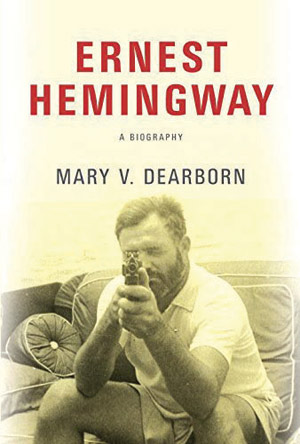Cover Gallery: Bridal Wave
June means the start of wedding season. These Post covers show beautiful brides of the twentieth century.
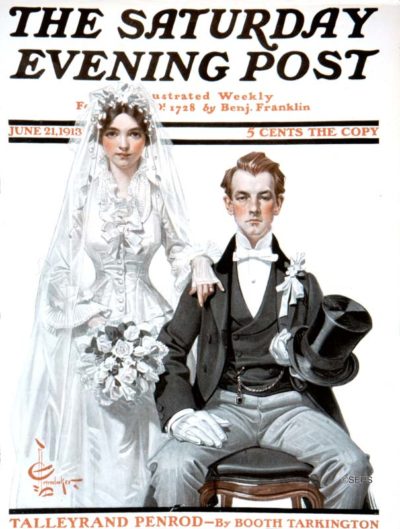
J. C. Leyendecker
June 21, 1913
In this painting by prolific artist J.C. Leyendecker, he shows a solemn couple having their photograph taken. Leyendecker illustrated the nuptial moments of other pairs, including Romeo and Juliet and Henry V and Catherine Valois. It appears this couple has got the “wedded” part down, if not the “bliss.”
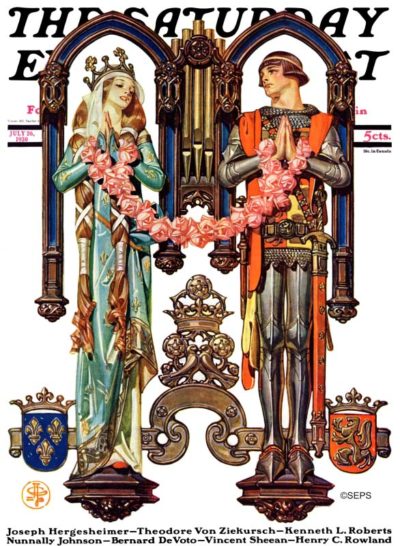
July 26, 1930
J.C. Leyendecker
Catherine of Valois married Henry V in June of 1420 and later gave birth to Henry VI. Henry V died shortly after his son’s birth, leaving the young Catherine a widow and her infant son the King of England.
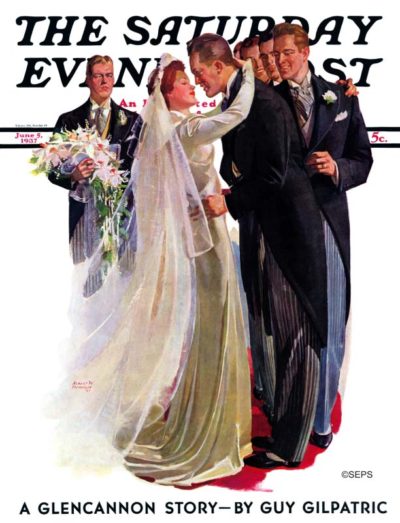
Albert W. Hampson
June 5, 1937
The groom doesn’t look too happy about this scenario. Given the line of enthusiastic groomsmen, the bride may not have enough energy for the honeymoon.
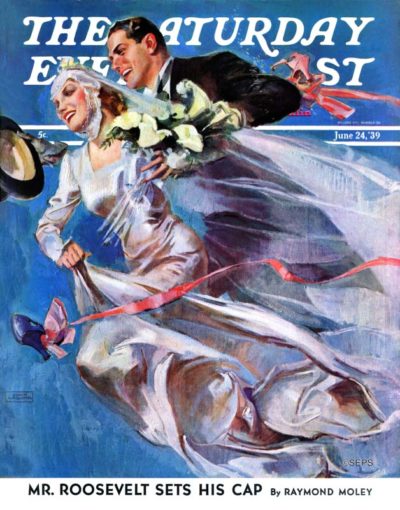
John LaGatta
June 24, 1939
LaGatta had an uncanny knack for translating from model to canvas an appreciation and sensual perspective of the female figure. LaGatta began his artistic process by sketching the models in charcoal and pastels and then would almost always refine his interpretation into an oil painting. His subjects were sophisticated, upper-class men and women with long graceful figures and with classic clothing designs. His images gave the impression that the models didn’t have a care in the world, as in this 1939 cover of a couple running off after their wedding ceremony.
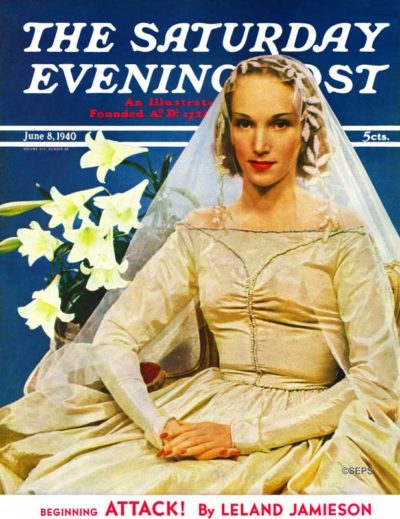
Wynn Richards
June 8, 1940
This 1940 bridal photograph was Wynn Richards’ one and only cover for the Saturday Evening Post. Richards was born “Martha Kinman Wynn” before marrying Dorsey Eugene Richards, according to her biography.. She opened her own photography studio in 1919, but left the business to a friend after a social scandal that involved her taking nude portraits of a local school teacher. Richards divorced her husband and left their son with his grandmother before opening a new portrait studio a few years later. Initially signing her work “Matsy Wynn Richards,” she learned that revealing her gender could hinder her career, and changed her signature to “Wynn Richards.” Richard’s work mostly appeared in Vogue, Harper’s Bazaar, and Mademoiselle magazine.
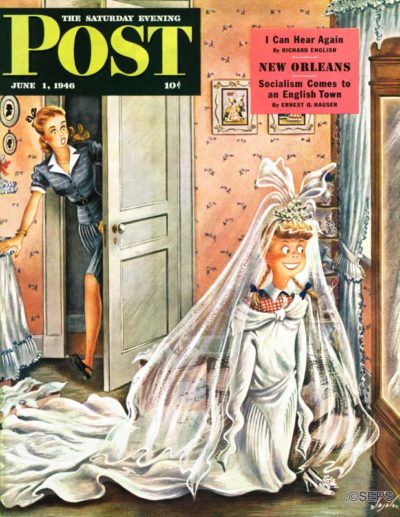
Constantin Alajalov
June 1, 1946
[From the editors of the June 1, 1946 issue of the Post] Just after Constantin Alajalov finished his kid-sister painting, he set out from New York for Florida, to work on other cover assignments. The artist went by automobile, and sent back a short report on his three-day journey. The highways are full of displaced persons at the moment, sorting themselves out after the great disruption of war, and we think Alajalov’s account is a thumbnail picture of America in Transition. “The first day,” he wrote, “I picked up a corporal just back from Tokyo, hitch-hiking to Alabama to marry a girl there. The second day I picked up a marine hitch-hiking to Jacksonville, Florida, to get his wife. The third day I picked up a sailor who was going to Miami for any girl he could get.”
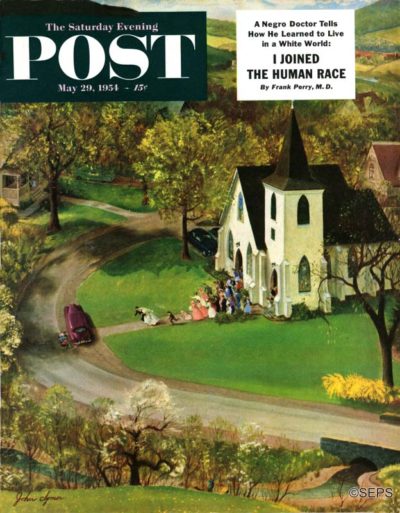
May 29, 1954
John Clymer
[From the editors of the May 29, 1954 Post] Away go the newly-marrieds into their brave new world and thank heaven it isn’t raining. John Clymer is nice about weather; on his covers it hardly ever rains. That church, says Clymer, is located in one state and the landscape in another state, and the honeymoon will take place in the state of bliss always visited on such trips.
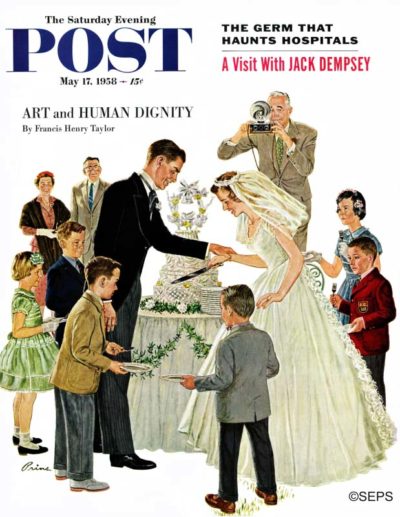
May 17, 1958
Ben Prins
[From the editors of the May 17, 1958 Post] Here come the bride and groom to carve the cake. Two-handed carving isn’t an efficient way to dismember food, but He and She have just become One and this is the tender symbol of their unity. They probably aren’t hungry; in a day or two food will become attractive, but right now they are not of this world, they are up in the clouds, in a state of bliss where folks subsist on love alone. Conversely, those youngsters have their feet on the ground and their eyes on the cake. Oh, the girls may save a few crumbs to put under their pillows to incite romantic dreaming, but the boys will put their cake where it belongs, and let’s hope they don’t consume enough to turn dreams into nightmares. Well, a toast to artist Ben Prins’ newlyweds: bon voyage, all the way through life!
North Country Girl: Chapter 2 — What I Didn’t Learn in Kindergarten
For more about Gay Haubner’s life in the North Country, read the other chapters in her serialized memoir. The Post will publish a new segment each week.
I had started kindergarten age four on the army base in Hawaii. My father, a captain, had wrangled this early admission to get me out of my mother’s hair while she coped with a new baby. After a several month gap in my education while we lived with my grandparents, I was sent off to Cobb Elementary School as soon as we moved into the Woodland house, in the middle of the school year. I was the new kid, the smallest kid, and a year younger than most of my classmates. The old maid teacher (the Duluth Board of Education required that all elementary teachers be grey or white haired spinsters) carefully instructed me that if I had to throw up I should not run around the room but stay in one place, the only useful thing I learned in kindergarten. I painted at the easel, sang Old McDonald, pressed my hand into a disc of wet clay to create a Mother’s Day present, and made not a single friend. This would have distressed my mother if she had had the time to notice; she spent the entire day wrestling with a skinny, shrieking, thrashing toddler who fought tooth and claw against sleeping and eating and everything else.
I was friendless, but not unhappy. I had my books and my dolls and a baby sister to boss around. And every day at 3, I had The Bozo Show on our black and white TV. When Bozo wasn’t showing cartoons, but clowning around in the studio, I went back to my book while Lani rampaged through the house. Neither of us were interested in Bozo’s puerile antics or the tedium of listening to the dozens of snotty-nosed kids squashed on bleachers trying to remember their own names for the camera.
At that time we only had two TV stations in Duluth, neither of which was particularly dedicated to children’s programs. On weekday mornings there was Romper Room, which my mother attempted to park my squirming sister in front of. I was a classic Goody Two Shoes and even I was repelled by Romper Room’s “Do Be a Do-Bee” kid propaganda. And I knew that at the end of each show when Miss Mary looked through her Magic Mirror, she would never see Gay and Lani, only Billy and Nancy and Susie.

The high point of my week was Saturday morning, the one time Lani and I could spend hours sprawled in all our glory and pajamas in front of the TV. The first thing to come on screen after the weirdly fascinating test pattern were wonderful old black and white cartoons, Merrie Melodies, Betty Boop, Popeye the Sailor Man, one after the other, with no interruptions from silly clowns or idiot children. Then came Mighty Mouse to save the day. The rest of the morning was not as idyllic, consisting of old half-hour shows thought suitable for kids: Roy Rogers, featuring Trigger and Dale Evans and for some reason Nellybelle the Jeep. The Lone Ranger and Zorro, both of whom were much handsomer and more dashing than stodgy Roy Rogers. Sky King, with his cute daughter, Penny, capturing various bad guys through aviation. And my favorites, the horse shows: Fury and My Friend Flicka.
I had a few plastic toy horses, inspired by the far better collection owned by my one and only friend, Judy Lindberg, who lived a few houses down from my grandparents in Carlton. Judy and I had become friends during my parent’s house-hunting days, when she was summoned to play with me. Round-faced Judy seemed almost as friendless as I was. I envied her world-class plastic horse collection, her thousands of Legos (My mother hated anything with lots of tiny pieces), and her status as an only child, a rare exotic when two kids seemed the minimum and lots of families had five or six. Judy’s very German grandfather, Karl, and her parents, Vera, with raven Elizabeth Taylor hair, and roly-poly Julius, owned Carlton’s one and only restaurant. The small café had a few booths along one side and on the other a long counter with those glorious chrome stools; Judy and I were strictly forbidden to do any spinning on them. On the counter and tables were the most adorable china cow creamers, as Minnesotans drank coffee with every meal. I broke one once, mesmerized by the stream of milk pouring out of the cow’s mouth, and I was scared for weeks to go to Judy’s house, terrified of what Germanic punishment might be meted out by her formidable grandpa Karl.

I got to play with Judy quite often, even after our move to Duluth; my family spent almost every Sunday in Carlton. While the adults sat around drinking and talking and drinking, I walked myself down the street to Judy’s, where we played horsies or Legos or fooled around with her mother’s electric organ, or I would sneak a look at Judy’s collection of fascinating, brightly-illustrated books that tried to explain Catholic theology at an 8-year-old level. Judy complained that reading wasn’t playing, and she was right.
***
If Judy wasn’t around on our Sunday trips to Carlton, I roamed about outside by myself, or explored my grandparent’s big house. On the ground floor there was a small wood-paneled room decorated with the heads of animals. My grandfather loved to hunt; in the winter he would drive around the county, dropping bales of hay off in the woods to make sure enough deer would survive so he could shoot them the following fall. There was an elegant living room that we never sat in; everyone congregated in the new glass-walled sunroom my grandparents had added on so they could look out at the snow eight months a year. My grandmother had remodeled her kitchen at the same time; her aqua blue and pale yellow kitchen was right out of Disney’s Tomorrowland and seemed the height of modern sophistication to me: the freezer made ice, there was a dishwasher, and the Formica counters were festooned with space age parabolas.
Upstairs were “the boys’ rooms” that had belonged to my dad and his two brothers. There the main attractions were the leather albums of coins and stamps from Rhodesia, Ceylon, French Guinea, and other exotic-sounding places I longed to visit even though those countries were just a colorful bit of paper or a coin with a hole stamped out; I could not have found them on a map.
Also upstairs was my grandma’s big bedroom, neat as a pin, reeking of Youth Dew, and too intimidating for me to do anything besides look at myself in her three-sided dresser mirror.
Best of all, my grandparents had a room just for books. It wasn’t big, but it was definitely a library, with towering bookcases on all sides holding hundreds of books in no particular order. There were tomes on dentistry, dusty fabric-covered novels with tiny type and no conversations, ancient nature books with pastel drawings of birds and moths—I just had to keep pulling books down from the shelves until I found something I could enjoy. When I did, I left that book on a lower shelf so I could find it again the following Sunday. There were two books I read again and again; a book on space travel, with lurid sci-fi paintings of the rings of Saturn as seen from the surface of that planet, and sunset on Mars with its two moons hanging in the sky; and a guide to hunting in Africa, bound in leopard-print paper and filled with black and white photos of living and just-shot gnus, zebras, lions, and a wide variety of antelope. If I ever go to Africa, I will carefully shake out my shoes every morning, having seen a photo of a large scorpion that had been extracted from the author’s boot. When I was in junior high, I discovered in my grandparents’ library an unaccountable paperback of Hell’s Angels by Hunter S. Thompson, with such horrifying descriptions of sex and violence, including bikers pulling a train on one poor girl, that I took special care in secreting it behind the encyclopedias so I could read it again and again. I have no idea who would have brought that book into that house.

My grandfather had a small bedroom tucked beneath the stairs, where he retreated immediately after Sunday dinner. I thought it was funny that my grandpa’s bedtime was 7:30 until I realized years later that this was his regular time to pass out from drinking 7&7’s all day. Every Sunday I scarfed down my own dinner as fast as possible to catch Lassie and the Walt Disney Show, which later became the even more unmissable Wonderful World of Color. My mother and grandmother cleaned up the dinner plates, my dad built himself a last highball, and then we piled back in the car, my dad drunk and all of us seat belt-less, to drive the half hour back home, where I had to go immediately to bed.
My grandfather’s brother was married to my grandmother’s sister, but while my grandpa was the big man and my grandma the snooty matron in their town of 400 souls, my great uncle Cliff and great aunt Marge were stuck on a farm with a thousand turkeys. Every Christmas Eve Cliff and Marge opened their rambling 1920’s house to dozens of relatives. Aunt Marge started baking in the beginning of December: there were cut-out sugar cookies shaped like stars, bells, and camels, dusted with red and green sugars; spritz cookies, ridged wreathes of pale green, decorated with those adorable little silver balls that you’re not suppose to eat, but that I could never resist crunching between my teeth; pfefferneuse, snowy with powdered sugar, that I always forgot I didn’t like until I had popped one in my mouth; chocolate drops, that I did like, tart lemon bars, homemade white bread to be slathered with butter, and stolen, studded with candied cherries and iced with white sugar frosting.

Marge made candy as well, a feat I have tried again and again to duplicate and consistently failed at: chocolate walnut fudge and penuche and divinity. These were the main attractions for me and it was torture to gaze upon the kitchen table groaning with sweets and not be able to have any until I choked down a plate of wild rice with mushrooms and chicken, baked ham, mashed potatoes, string bean casserole, and ambrosia salad. There were bowls of many other things, such as beets and lima beans, that I didn’t eat, and since it was Christmas, nobody made me. It was farmhouse cooking at its most gargantuan. I don’t think anyone even thought of bringing a dish to Aunt Marge’s Christmas Eve. It would have been like showing up at the miracle of the loaves and fishes with a Tupperware container of pasta salad. Our family did presents Christmas morning, after Santa came. Cliff and Marge did presents Christmas Eve, between bouts of eating. There was always one present for me, so I would have something to open; I tried not to look disappointed at the handmade monkey sock puppet or yoyo doll. Then there was that annus horribilius when my sister got a Raggedy Ann doll, something I had always wanted; I gleefully torn open my own gift to reveal the dreaded stitched grin of Raggedy Andy. I cried all the way home.
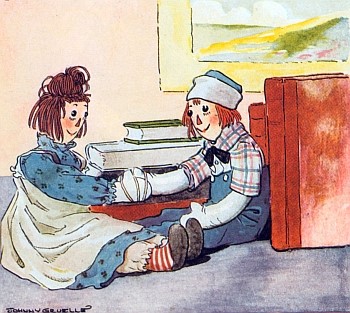
George Orwell’s 1984: A Review
We share a review of George Orwell’s 1984 from The September 1, 1972, issue of the Post, 23 years after the initial publication of the book. The reviewer notes, “The realization has been gradually growing that Orwell possessed completely remarkable insights and foresights, that he saw something then that the rest of us are only beginning to see now.”
Sales of the influential book have spiked in the last four months, as people once again find Orwell’s writing to have resonance in today’s political climate.
***
When it appeared in 1949. Orwell’s ominously titled 1984 doubtless seemed to many to be at most an absurd parody of the Russian communist state, so overdrawn and so farfetched that it offered little to the reader.
But each successive year since its initial publication has brought revised appraisal, a growing anxiety on the part of past and new readers alike that it was just possible that they were missing the message. The realization has been gradually growing that Orwell possessed completely remarkable insights and foresights, that he saw something then that the rest of us are only beginning to see now.
Orwell was born in Bengal at the beginning of this century, completed his formal education at Eton, became a thoroughgoing Socialist who fought with the Loyalists during the Spanish Civil War. He was to die at forty-six, but not before he had clearly, if frighteningly, depicted the fate of mankind if the direction of political and social forces were not reversed.
In the present edition Erich Fromm has written a short but illuminating “Afterword” that ought to be read before tackling 1984 itself.
Reviewing earlier Utopias, such as the work of Thomas More which gave us the name, Fromm correctly identifies them as expressions of the perfectibility of man, as the basis for a happy optimism about man’s future.
Against these he contrasts the “negative utopias” of which 1984 is perhaps the most notable. Writing of them, he even anticipates the title that Skinner was to choose ten years later: “The question is a philosophical, anthropological and psychological one, and perhaps also a religious one. It is, can human nature be changed in such a way that man will forget his longing for freedom, for dignity, for integrity, for love—that is to say, can man forget he is human’!”
Winston Smith is the man about whom Orwell’s book revolves, London is the scene of the action, and all through the narrative words and expressions evolve which have worked their way into our own everyday vocabularies.
Winston’s flat, like everyone’s, is under the eternal surveillance of a telescreen through which, as posters everywhere proclaim. BIG BROTHER IS WATCHING YOU. Not too far away was the Ministry of Truth, said to contain three thousand rooms, which carried on its side these distillations of party wisdom:
War Is Peace
Freedom Is Slavery
Ignorance Is Strength
There was “the Ministry of Peace, which concerned itself with war; the Ministry of Love, which maintained law and order; and the Ministry of Plenty, which was responsible for economic affairs. Their names, in Newspeak: Minitrue, Minipax, Miniluv and Miniplenty.”
We witness a forbidden love that began and briefly flourished under the unseen eyes of the Thought Police, a love that subsequent torture led both participants to betray and denounce the other.
We see history recorded, history erased, so that nothing is known of yesterday, so that even the today that we think we see is wholly the contrivance of Big Brother.
We observe O’Brien from the Thought Police, presiding over the degradation and reconstitution of Winston, by means of drugs, electric shock treatments, starvation, beating. We hear him summarize the new world the party was forging.
“In our world there will be no emotions except fear, rage, triumph, and self-abasement. . . . We have cut the links between child and parent, between man and man, and between man and woman. No one dares trust a wife or child or a friend any longer. If you want a picture of the future, imagine a boot stomping on a human face—forever.”
Fromm ends his “Afterword” with the admonition that “Books like Orwell’s are powerful warnings and it would be most unfortunate if the reader smugly interpreted 1984 as another description of Stalinist barbarism, and if he does not see that it means us, too.”
The People Nobody Wants: The Plight of Japanese-Americans in 1942
Originally published May 9, 1942
On the fateful day that Lt. Gen. John L. De Witt, chief of the Western Defense Command, ordered the removal of all persons of Japanese blood from the Pacific Coast Combat Zone, chunky little Takeo Yuchi, largest Japanese farmer in “the Salad Bowl of the Nation,” California’s Salinas Valley, was wrangling over the telephone with a produce buyer in San Francisco.
“That fellow purchases for the Navy,” he said, slamming down the phone. “He wants me to grow more Australian brown onions because the Navy needs them. The Army tells us to evacuate our farms right now. Just where do we stand, anyway?”
In a dozen areas, from San Diego to Seattle, set apart on Pacific Coast defense maps as “Japanese islands,” thousands of American citizens of Nipponese extraction were faced with similar dilemmas. The Nisei, or second-generation Japanese, had long anticipated that the Issei, or Japan-born aliens, would be ordered from the coast defense zone. But not that American citizens might go with them. Like Takeo Yuchi, they were stunned.
At least half of the 112,905 people of Japanese ancestry affected by the order were rooted in the soil; the rest were fishermen, merchants, hotelkeepers, nurserymen, gardeners, or in domestic service. It temporarily deprived 71,896 American citizens of their constitutional rights. It launched in its course the greatest hurry-up mass hegira this country has seen.
“Tak’s going to leave a hole here when he pulls out,” a professional man who went to school with Yuchi told me the day De Witt’s order came through. “I’ve known him ever since he was the best sprinter in Salinas High.”
Yuchi’s own family, consisting of his alien mother, his Salinas-born wife, his 8-year-old daughter, 6-year-old son, and a baby daughter, is an average California-Japanese household. His wife’s brother, Hideo Abe, is in the Army. His younger brother, Masao, was called in by the local draft board for his physical examination the day I was there. Of the 21,000 Japanese families on the Pacific Coast, one in every five has contributed a son to the Army.
“Well, are you going to go voluntarily or wait until the Army evacuates you?” I asked.
“It’s a tough one to figure out,” Yuchi replied. “I’m American. I speak English better than I do Japanese. I think in English, not Japanese.”
After leaving the Yuchi household, I called on another Nisei, Dr. Harry Y. Kita, a dentist. Prior to Pearl Harbor, Kita, a University of California graduate, enjoyed a thriving practice. Half of the patients who sat in his three chairs were whites. Since then, most of them had been from the Japanese community. “I haven’t much practice left,” said Kita, with a hearty but forced laugh. “I understand why it is,” he continued. “I feel American. I think American. I talk American. My only connection with Japan is that I look Japanese.”
“Could you tell a good Japanese from a bad one?” I asked him.
“No more than you could,” he replied. “But if I knew one who was disloyal to this country, you can bet I’d turn him in.”
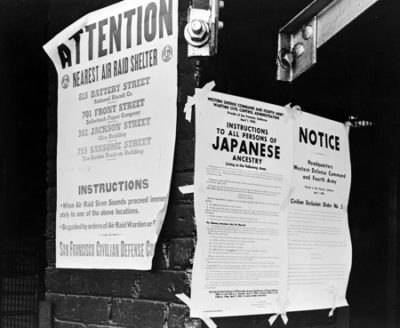
Dorothea Lange
Vegetable Wars
From white vegetable growers I heard the other side of the story. The Salinas Vegetable Grower-Shipper Association had just published a brochure titled NO JAPS NEEDED to counteract a widespread impression that Californians would go hungry if the Japanese truck gardeners were removed. The dislike of the militant Grower-Shipper Association for the valley’s Japanese farmers is an old and bitter one. The association is composed of a few score large-scale white growers who lease lands, produce lettuce, carrots, and other fresh vegetables the year round in the Salinas, Imperial, and Salt River Valleys for the Eastern markets. … At one time the lettuce growers, like the sugar-beet growers, depended upon Japanese for field labor. As the Japanese, one by one, became farmers in their own right, and competitors, their places in the field were taken by Mexican or Filipino labor. White men and women, largely Oklahomans, handled the trimming, icing, and crating in the packing plants, but they were never able to endure the back-breaking stoop work in the fields. Only the short-legged Japs could take that.
Shortly after December 7, the association dispatched its managing secretary, Austin E. Anson, to Washington to urge the federal authorities to remove all Japanese from the area. “We’re charged with wanting to get rid of the Japs for selfish reasons,” Anson told me. “We might as well be honest. We do. It’s a question of whether the white man lives on the Pacific Coast or the brown men. They came into this valley to work, and they stayed to take over. … If all the Japs were removed tomorrow, we’d never miss them in two weeks, because the white farmers can take over and produce everything the Jap grows. And we don’t want them back when the war ends, either.”
The Japanese-American loyalty creed, to which all Nisei publicly subscribe, is about to get its first real test, particularly these portions of it: “… I am firm in my belief that American sportsmanship and attitude of fair play will judge citizenship and patriotism on the basis of action and achievement, and not on the basis of physical characteristics. … Although some individuals may discriminate against me, I shall never become bitter or lose faith, for I know that such persons are not representative of the majority of the American people. …” In such a test, the tolerance of the new host states will also feel the fire which has been ignited by the obvious requirements of a stern military emergency.
—“The People Nobody Wants,” Frank J. Taylor,
May 9, 1942
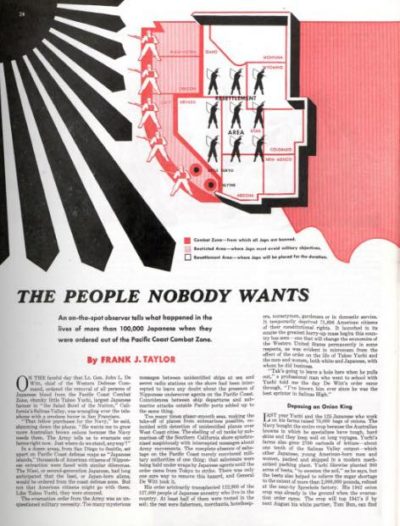
This article is featured in the May/June 2017 issue of The Saturday Evening Post. Subscribe to the magazine for more art, inspiring stories, fiction, humor, and features from our archives.
Also read Unwanted: A Teenage Memoir of Japanese Internment from the May/June 2017 issue of The Saturday Evening Post.
Vintage Advertising: The Lincoln Memorial
After decades of planning, budgeting, and construction, the Lincoln Memorial was finally dedicated on May 30, 1922. Americans were proud of this beautiful monument and eager to visit it. Companies wasted no time using the memorial to advertise a connection to their products. These advertisements appeared in the Post between 1921 and 1948 and hawked everything from tires to tombstones.
The Lincoln Memorial has taken on additional layers of meaning since the 1920s. As Jay Sacher noted, “the memorial is cultural shorthand for both American ideals and 1960s radicalism.” It is rarely seen in ads anymore. The memorial still makes regular film appearances, an easy stand-in for Heavy Symbolism. However it is used, the Lincoln Memorial will continue to transcend the banal appropriations of its image.
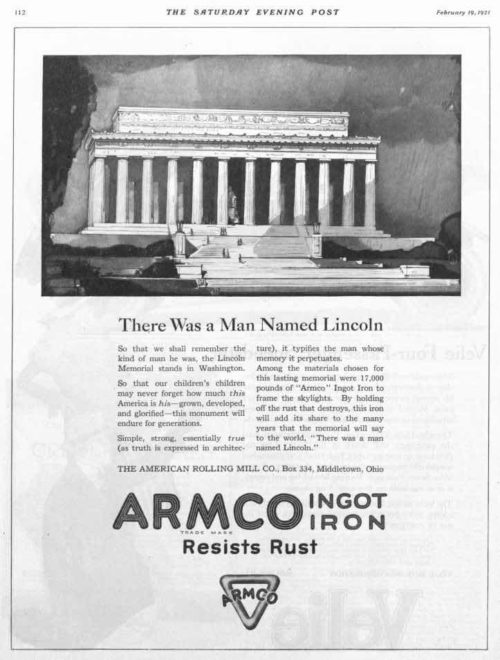
February 19, 1921
Click to Enlarge
Armco iron was used in the construction of the Lincoln Memorial, a fact that warranted several full-page ads in the Post.
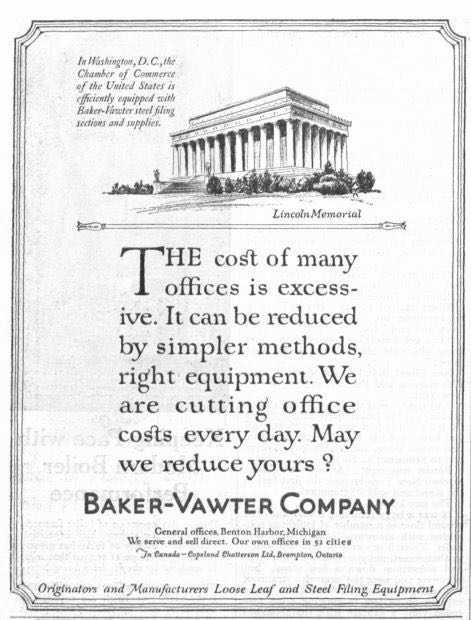
October 28, 1922
Click to Enlarge
We’re not sure what the Lincoln Memorial had to do with a company that made ledger sheets and looseleaf binders, but they seemed to hope that the monument would lend them an air of dignity. The Lincoln Memorial certainly didn’t represent “cutting office costs,” as its construction costs in today’s dollars were north of $40 million.
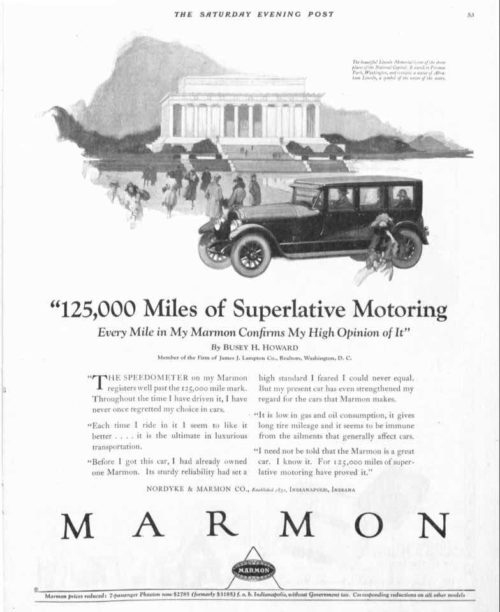
December 1, 1923
Click to Enlarge
Marmon made cars in Indianapolis from 1902-1933. The Lincoln Memorial serves as the majestic backdrop to emphasize “the ultimate in luxurious transportation.”
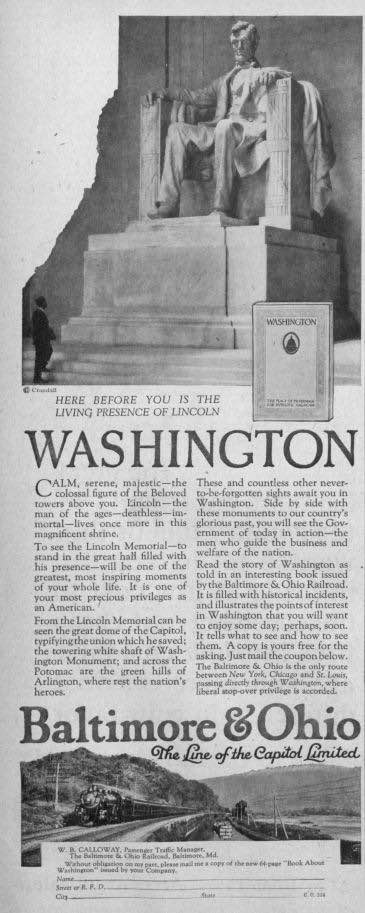
March 14, 1925
Click to Enlarge
Many Americans wanted to visit this new monument, but how were they to get there? The Baltimore & Ohio Line, of course – the “only route New York, Chicago and St. Louis, passing directly through Washington, where liberal stop-over privilege is accorded.” (No such privileges for the conservatives?)
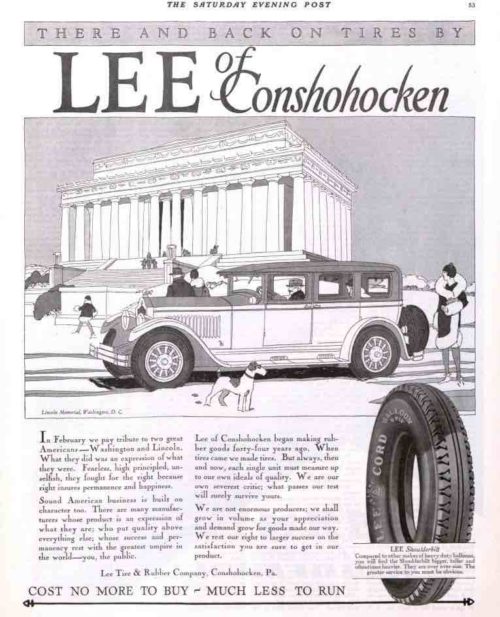
February 25, 1928
Click to Enlarge
Of course, if you’d rather drive than take the train, you’ll need a good set of tires to get you there.
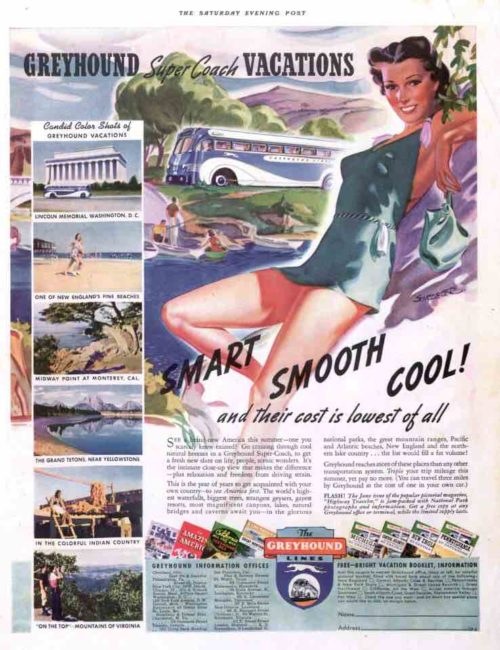
June 4, 1938
Click to Enlarge
The Lincoln Memorial takes a backseat to this green-suited come-hither swimmer in an age where sex was starting to trump integrity as a selling point.
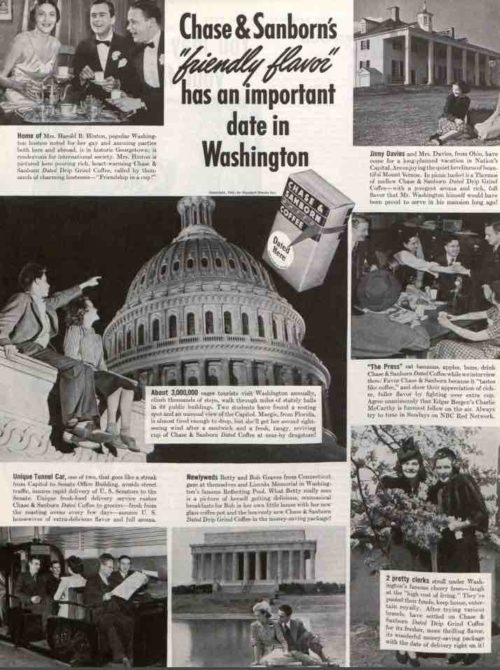
May 4, 1940
Click to Enlarge
The Lincoln Memorial once again gets low billing. In case you can’t read the caption, it says, “Newlyweds Betty and Bob Graves from Connecticut gaze at themselves and the Lincoln Memorial in Washington’s famous Reflecting Pool. What Betty really sees is a picture of herself getting delicious, economical breakfasts for Bob in her own little house with her new glass coffee pot and the heavenly new Chase & Sanborn Dated Drip Grind Coffee in the money saving package!” Our research was unable to confirm if that’s what Betty was actually seeing.
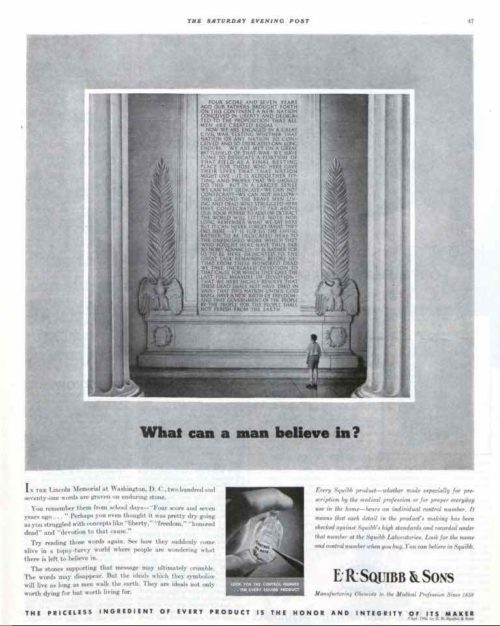
January 11, 1941
Click to Enlarge
Pharmaceutical manufacturer Squibb offers inspiring words – “The stones supporting that message may ultimately crumble. The words may disappear. But the ideas which they symbolize will live as long as men walk the earth.” (Buy our drugs.)
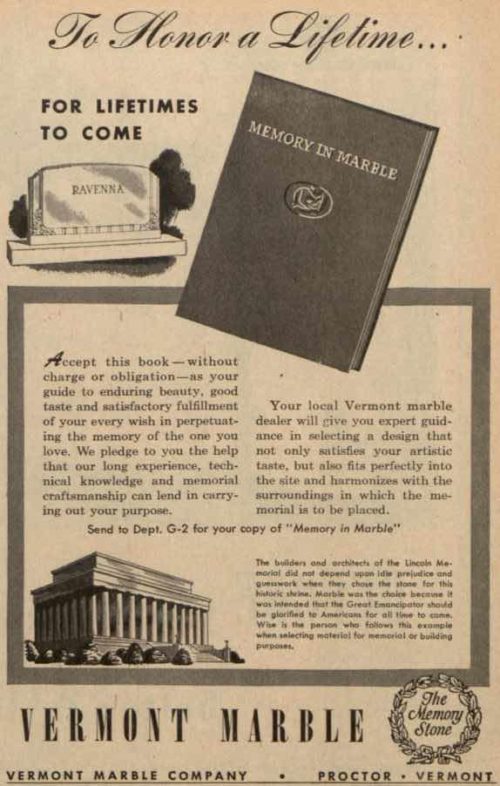
May 1, 1948
Click to Enlarge
The argument is that the Lincoln Memorial is made out of marble, so your tombstone should be, too. “Wise is the person who follows this example when selecting material for memorial or building purposes.”
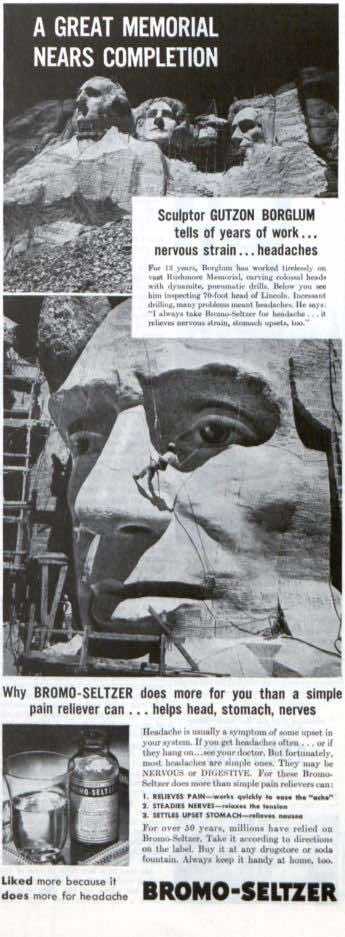
August 31, 1940
Click to Enlarge
We threw in this ad just to show that the Lincoln Memorial wasn’t the only monument used in the service of advertisers. The sculptor of Mt. Rushmore ostensibly took Bromo-Seltzer for his headaches. Early versions of this medicine contained sodium bromide, a tranquilizer. That may not have been such a good idea when he was dangling off the side of Lincoln’s nose.
“Comrades in Arms” by Josephine Daskam Bacon
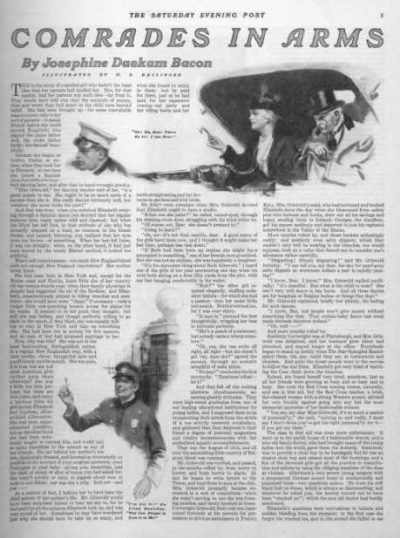
This is the story of a spoiled girl who hadn’t the least idea that her parents had spoiled her. Nor, for that matter, had her parents any such idea — far from it. They would have told you that the amounts of money, time and worry they had spent on the child were beyond belief. She had been brought up—for some inscrutable reason known only to her sort of parents — to speak French before she could speak English; she played the piano rather well, the violin rather badly; she danced beautifully.
German she began at twelve, Italian at sixteen, when they took her to Florence; at one time she joined a Spanish class, but shifted to barefoot dancing later, and after that to hand-wrought jewelry.
“Miss Griswold,” her dancing teacher said of her, “is a great puzzle to me. She ought to be so much more of a success than she is. She really dances extremely well, but somehow she never looks the part!”
And that was true; when you watched Elizabeth swaying through a Spanish dance you decided that her regular features were really rather cold and classical; but when she lifted her left foot, in that attitude of one who has unwarily stepped on a toad, so common to the Greek friezes, and paused, listening, you realized that her eyes were too brown — or something. When her hair fell loose, it was too straight; when, on the other hand, it had just been waved by the trusty Marcel method, it looked too artificial.
Was it self-consciousness — too much New England blood with not enough New England convictions? Her mother never knew.
She had been born in New York and, except for the Maine coast and Florida, knew little else of her country till her twenty-fourth year, when their family physician in despair had suggested the air of the Rockies; and Elizabeth, conscientiously attired in riding breeches and sombrero—she would have worn “chaps” if necessary — rode a vulgar little cow-punching bronco across the plains for six weeks. It seemed to do her good, they thought; but still she was listless, and though perfectly willing to go back to the ranch, if they liked, she was equally willing to stay in New York and take up something else. She had been out in society for five seasons, and no man or boy had proposed marriage to her.
Now, why was this? She was not in the least bad-looking; distinguished, rather, in a regular New Englandish way, with a clear profile, clever, thoughtful eyes and a sufficiently mobile mouth. She was pale, it is true, but are not most American girls rather pale than otherwise? She was a little too thin perhaps, but these are thin years, and many a luscious little fat girl envied Elizabeth her hipless, slim-ankled silhouette. She had been super-educated possibly; but on the other hand she had been sedulously taught to conceal this, and could talk as many banalities to the minute as any of her friends. She sat behind her mother’s tea urn, charmingly dressed, and listened as interestedly as possible to the account of your surgical operation, your Pekingese or your baby—giving you, meantime, just the dash of cream or slice of lemon you had asked for. She wasn’t prickly or catty or piggish about men or rude to her elders; nor was she a prig. And yet—and yet —
As a matter of fact, I believe her to have been the chief sorrow of her mother’s life. Mr. Griswold would have been surprised indeed to hear me say so, for he had paid for all the subjects Elizabeth took up, and was very proud of her. Sometimes he may have wondered just why she should have to take up so many, and what she found to enjoy in them; but he paid for them, just as he had paid for her expensive coming-out party and her riding boots and her teeth-straightening and her lectures on gardens and wild birds.
He didn’t even complain when Mrs. Griswold decided that Elizabeth ought to have a studio.
“B-but can she paint?” he called, round-eyed, through his dressing-room door, struggling with his third white tie.
“Of course not, Ben; she doesn’t pretend to.”
“Going to learn?”
“Oh, no — it’s not that, exactly, dear. A good many of the girls have them now, and I thought it might make her feel freer, perhaps less tied down.”
“If Beth had been born an orphan she might have amounted to something,” one of her friends once grumbled. But she was not an orphan; she was hopelessly a daughter.
“It’s the darnedest thing about Beth Griswold,” I heard one of the girls of her year murmuring one day when we were both sitting on a float fifty yards from the pier, with our feet hanging comfortably in the water.
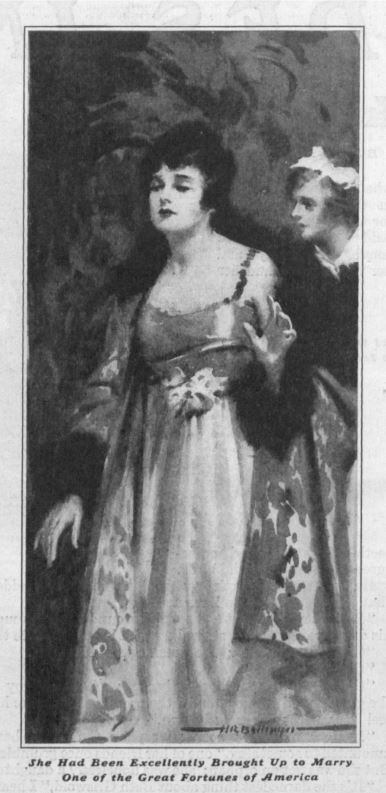 “Huh?” the other girl inquired elegantly, stuffing sodamint tablets—for which she had a passion — into her moist little red mouth. Neither noticed me, for I was over thirty.
“Huh?” the other girl inquired elegantly, stuffing sodamint tablets—for which she had a passion — into her moist little red mouth. Neither noticed me, for I was over thirty.
“It sure is,” pursued the first thoughtfully, wriggling her toes in intricate patterns.
“She’s a peach of a swimmer, but nobody cares a whoop somehow.”
“Oh, yes, she can swim all right, all right — but she doesn’t get ‘em, does she?” agreed the second, through an ecstatic mouthful of soda mints.
“No pep!” concluded the first succinctly. “Dead man’s float — let’s?”
And they fell off the rocking platform simultaneously, assuming ghastly attitudes. They were high-stand graduates from one of our leading educational institutions for young ladies, and I supposed them to be recuperating their minds from the strain of a too strictly censored vocabulary, and gathered that they deplored in their friend a degree of personal magnetism and vitality incommensurate with her undoubted aquatic accomplishments.
That was the August of 1914, and all over the astonishing little country of Belgium blood was running.
Mr. Griswold was worried, and passed, as the months rolled by, from worry to horror, and from horror to alarm. At last he began to write letters to the Times, and read them to men at the club. Mrs. Griswold promptly became enmeshed in a web of committees — when she wasn’t serving on one she was forming another, and rarely lunched at home. Cortwright Griswold, their only son, hammered furiously at his parents for permission to drive an ambulance in France; Katy, Mrs. Griswold’s maid, who had buttoned and hooked Elizabeth since the day when she blossomed from safety pins into buttons and hooks, drew out all her savings and began sending them to Ireland; Georges, the chauffeur, got his papers suddenly and departed to join his regiment somewhere in the Valley of the Marne.
More months rolled by, and shoes became sickeningly costly; and suddenly even satin slippers, which they couldn’t very well be wearing in the trenches, one would suppose, took on a value that forced one to consider one’s allowance rather carefully.
“Disgusting! Simply disgusting!” said Mr. Griswold irritably. “I can tell you, my dear, the day for pearl-gray satin slippers at seventeen dollars a pair is rapidly passing!”
“I know, Ben; I know,” Mrs. Griswold replied pacifically; “it’s dreadful. But what is the child to wear? She can’t very well dance in tan boots. And all these dances are for hospitals or Belgian babies or things like that.”
Mr. Griswold explained, briefly but plainly, his feeling for such dances.
“I know, Ben, but people won’t give money without something like that. That orphan-baby dance last week made thirteen hundred dollars.”
“Oh, well — ”
And more months rolled by.
Suddenly Cortwright was at Plattsburgh, and Mrs. Griswold was delighted, and her husband grew silent and absorbed, and stayed longer at the office. Everybody began to stand up jerkily when The Star-Spangled Banner asked them, Oh, say, could they see, at restaurants and theaters. And quite the nicest people went to the movies to follow the war films. Elizabeth got very tired of watching the Czar climb down the trenches.
Indeed, she found herself very tired, somehow, just as all her friends were growing so busy and so busy and so busy. She took the Red Cross nursing course, naturally, and one in first aid, but the Red Cross teacher, a brisk, flat-chested woman with a strong Western accent, advised her very frankly against going into any but the most elemental mysteries of her fashionable science.
“You see, my dear Miss Griswold, it’s so much a matter of pursonal’ty,” she said, “nursing is; and reelly, I must say I don’t think you’ve got the right pursonal’ty for it — if you get my idear.”
The class in first aid was even more unfortunate. It went on in the parish house of a fashionable church, and a nice old family doctor, who had brought many of the young ladies into the world, gave them the lectures. Somebody was to provide a choir boy to be bandaged, but he was an elusive choir boy and missed most of the mornings, and a few of the cleverest girls got all the practice in resuscitation and splints by using the obliging members of the class as victims. Afterward a very severe young surgeon with a pronounced German accent burst in unexpectedly and examined them—two questions apiece. He wore his stiff black hair en brosse, which is always so disconcerting, and whatever he asked you, the answer turned out to have been “cracked ice”; which the nice old doctor had hardly mentioned.
Elizabeth’s questions were convulsions in infants and sudden bleeding from the stomach; in the first case she forgot the cracked ice, and in the second she failed to see how it could be usefully applied, unless the patient could be induced to eat it, and as she presupposed him to be unconscious at the time, she didn’t suggest it. When they turned up at the parish house the next week to get their diplomas, they were met by a typewritten slip, sandwiched between the choir rehearsal and the Ladies’ Auxiliary, which informed them that none of the class had passed!
Elizabeth didn’t care very much; it had been her mother’s idea. She went languidly to a set of talks on the Balkan Situation, where everybody knitted; and later joined a committee for collecting old linen for a big, new surgical-dressings committee. But the district given her was away up on the West Side, and as she couldn’t take the motor on those days and wasn’t allowed to use the subway, she stood so long on the corner in the rain waiting for the bus that she caught a heavy cold, which ran into tonsillitis — it was, you will remember, a tonsillitis year — and by the time she could get out again her place on the committee had been filled by an energetic girl with an electric runabout of her own.
The months rolled by and there was getting to be quite a little list of Americans who had been killed, in one way or another, on account of this horrible European war, and many of her friends wore little button knots of Allied ribbon. Mrs. Griswold was forced in the interests of digestion to ask guests not to mention the President if they could help it, it made Ben so angry; and Cortwright, who became 21 on a Tuesday, ran away to France with one of his cousins on the Thursday following, and drove his new birthday car through the second war zone, filled with hospital supplies. Mr. Griswold scolded him soundly by letter and boasted of him at the club, and his mother turned his bedroom and study into a shipping depot for tobacco for the trenches and old clothes for various devastated regions.
Mr. Griswold became chairman of one of the relief committees at the club and secretary and treasurer of a Harvard Alumni committee, and went to a great many men’s dinners. As Mrs. Griswold rarely came home to luncheon now, and the cook’s son had recently joined the National Guard, which for some reason preyed on his mother’s mind to such an extent that she confined herself to what she called some little thing on a tray for Miss Elizabeth, the girl, who had never been much interested in her food, began to grow really thin and you noticed her cheek bones.
I mentioned this, incidentally, to Mrs. Griswold, who became extremely vexed and left me with the impression that Elizabeth was very unpatriotic to have grown so thin, and I nearly as much so to have remarked it. A bottle of port-and-iron was placed on the sideboard, out of which the girl very sensibly poured a little over the roots of the table ferns now and then. I call her action sensible because iron disagreed with her digestion — feeling, indeed, like a sharp three-cornered stone in her chest—and the port went to her head.
The months rolled on, and now a strange thing occurred: utterly aside from Europe, and the President, and the ridiculous state of the Army, and the probable effect of German propaganda on the Irish, something happened to Elizabeth herself! Something, actually, which her mother had not planned and her father had not paid for — something she stumbled into all alone!
It happened in this way:
She was in the habit of going to her Cousin Lou’s once a week or so, to play with the children when their mademoiselle went for her weekly afternoon out, an afternoon devoted nowadays to packing great bales of comforts for the American Fund for the French wounded. There had always been a Fraulein until now, but when all the Frauleins turned out to be without doubt German spies—;they spent their time in giving important Germans maps of their employers’ houses—Cousin Lou turned away hers, weeping—she had been the most marvelous packer, my dear, and knitted the most beautiful sweaters, and the baby cried for a week! —and engaged Mlle. Dupuy, who slapped the children, one feared, and had headaches; but then, think what France did for us when we were fighting for our freedom!
Elizabeth was really fond of children and got on well with them. She sang them funny little French songs that her old bonne had been used to sing to her: Maman, les Oils bateaux qui s’en vont and Il pleut, it pleut, bergere; she tied bandages on their wounded soldier dolls; she even had tea with them occasionally.
One afternoon Lou was having a meeting at her house, and mademoiselle had agreed to stay with the children, as it was raining. Elizabeth, who had come as usual, strayed into the meeting, at her cousin’s earnest request, and listened politely to the speaker, an eager, dynamic little creature —nobody in particular, really — with a solid genius for organization and inspiration. She had been a trained nurse, it appeared, had married a doctor, and lived in an apartment on Gramercy Park. She had raised thousands of dollars for the orphaned children of France, and did mighty fieldwork as a missionary for that cause. Indeed, she threw out, in passing, the desire of her heart was to dedicate herself entirely to that work and direct it from the city headquarters all day long, but that she could not feel justified in leaving her three children, the oldest not yet seven, to the care of servants.
“Think, only think!” she cried, throwing out her arms with an impassioned little gesture, “think what I could do for this wonderful work of ours if only some one of the hundreds of nice women in New York who are of no earthly use to anybody would come and take care of my children! I don’t say wash them and blow their noses for them and tidy their rooms — I can afford a good nurse for that. But my husband doesn’t approve of schools for children until they are eight years old, and I’ve always been with them a great deal; I don’t want to leave them with servants. Somebody ought to organize all the women who haven’t any special gift and release those of us who have! They ought not to expect any pay” — her smile was half whimsical, half fanatic —“they ought to feel that they’re just doing their bit. Don’t you agree with me, ladies?”
They laughed and applauded enthusiastically; her ardor was contagious. “Heavens! I wish she could reorganize the office for us!” murmured the woman whose name headed the engraved letter paper of the great charity; “she’s a little wonder!”
Then they moved and seconded for a few minutes and went on to the next thing — all, that is, but Elizabeth. She sat staring at the little speaker, and later followed her quietly into a Madison Avenue street car.
“I am Elizabeth Griswold,” she explained, “and I wondered if you would be willing to let me take care of your children while you were at headquarters? I could come every day if you liked. Lou Delanoy is my cousin.”
“I think that’s perfectly fine of you, Miss Griswold,” cried the little wonder delightedly. “I should like to be at headquarters from nine till five, except Saturdays, this month anyway. Things are in an awful mess down there. I’ll have Dagmar bring the children right down to the park to you on fine days, and then she can address circulars for me and attend to the telephone. I knew there must be hundreds of girls who would like to help me out, but I didn’t expect to find one so soon. And you realize, don’t you, that you’ll be doing every bit as much in your way as I shall be in mine?”
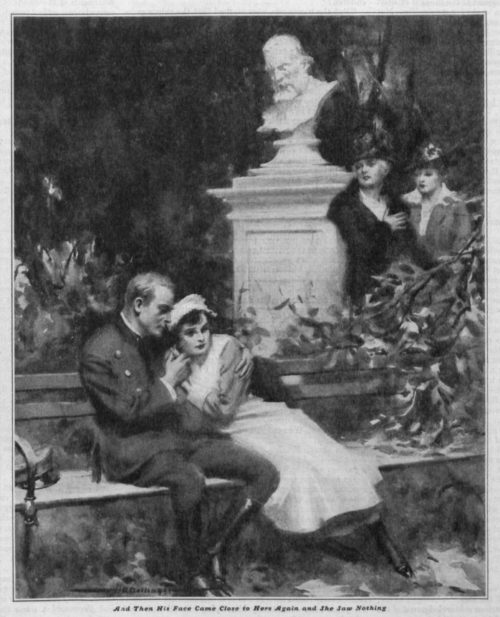 Elizabeth smiled vaguely.
Elizabeth smiled vaguely.
“I wanted to do something,” she said. “Shall I come tomorrow?”
Her next step I am almost ashamed to tell you, if you happen to be a sensible, practical person: She went to a most expensive specialty shop on the expensive avenue and asked for nurses’ uniforms. Blue ones she purchased, with bib aprons and little caps that stood up in the front; and when the attendant asked “Will you like to look at the capes and bonnets, miss?” she nodded seriously.
“They’re thirty dollars — but of course the war — ” murmured the attendant; and Elizabeth, to whom it had never occurred that a coat could be purchased for thirty dollars, said gravely “Of course.”
“The nurse will be about your size, miss?”
“Yes—about my size,” said Elizabeth.
Now of course you and I would never have been so foolish. We know that one can sit in Gramercy Park and superintend the play of three children in whatever dress she happens to have on at the time — a bathing suit, as far as that goes, were it not for the park regulations. But Elizabeth, you must remember, was only 24, and had, like most people, her own particular little romantic tendencies. They may not have been yours or mine, but they were hers; and, besides, all her friends were fussing about some kind of uniform or other — this was her uniform.
She never, in her wildest dreams, could have imagined what that uniform was to do for her!
At eight the next morning she stood by her mother’s breakfast tray.
“I’m doing some work for the Relief Reorganization Committee,” she announced briefly; “I’ll be busy all day, probably.”
“That’s good,” Mrs. Griswold replied, her eyes on her mail; “there’s nothing like an interest — Oh, what a fool that stenographer is! I shall simply have to have a special one for my department, that’s all. Remember, dear, we’re dining at seven tonight—your father had to take a box for that Serbian Relief concert. I asked Doctor Henderson.”
Elizabeth left the room in silence, with her lips pressed together. She understood perfectly well about Doctor Henderson. He was forty and distinctly baldish and a little tiresome. Adenoids were — or was — his specialty, and he danced painstakingly, with a tendency to perspiration and counting the time under his breath. Nobody had ever suggested that since she was nearly 25 and since he was the only unmarried man — at least he was a widower — who had ever shown the least interest in her, and since he was doing very well indeed and would undoubtedly do much better, why, he was a very desirable extra man to sit in the box or go on to a dance later. Nobody, I say, had ever so slightly suggested it, but Elizabeth understood very well. She was serious; Doctor Henderson was serious. The inference was obvious.
Of course it all seems very queer to me, if you ask me. Why a young person should be brought up like a duchess in order to marry a surgeon at the last, I can’t see. He was making, we’ll say, 20,000 a year; maybe a bit less, maybe a bit more. But we all know what rents are in New York, and a doctor must have a decent house in a decent part of the town if he wants to cut out rich children’s adenoids. And Elizabeth didn’t know whether chops grew in the sheep’s cheeks or in its legs. And I told you what her evening slippers cost. She had no idea what wages parlor maids get nowadays or what coal costs a ton. Somebody had always turned on her bath for her, and one day when her little satin bed shoes had not been placed by the side of her bed, she had been obliged to sit on her toes and call to her mother to ring for Katy to ask where they were! It is not that she was lazy at all, I assure you, but it never occurred to her that it was a part of her duty to hunt for her bed slippers.
In other words, she had been excellently brought up to marry one of the great fortunes of America; or perhaps it is only fair to add that she would have been useful to a brilliant young attaché to an important foreign embassy — but even he would have had to be reasonably well off, don’t you see?
The three little Gramercy Park children didn’t worry over all this, however. They were nice children and they took to Elizabeth promptly.
This isn’t a bit like the old novels, you see; there is no suffering governess involved, patiently bearing with the rudenesses and cruelties of the brutal and the rich. No; it is really true that children brought up by their mothers are infinitely nicer and more interesting than children brought up by servants. The names of these children were Marjory and Barbara and Kenneth, and they were as pleasant as their names. Marjory rolled a hoop, Barbara pretended to be an Indian, and Kenneth sat in a sort of infantile bath chair and talked to the birds, having but slight command of ordinary English. Elizabeth sat on a bench and impersonated, alternately, a buffalo and a white captive, neither of which roles was at all difficult. Her hands were in her lap and she gazed at the spring sky and the feathery trees. She was particularly contented and was enjoying a new sensation; she was looking prettier than ever before in her life, and she knew it!
For that strange thing, artistic setting, had transformed her, and though it might take an artist to have analyzed this, it didn’t require an artist to realize it, you see. Elizabeth had always been dressed by her mother, who had never been able to resist managing everything and everybody round her, and she had never observed that what had suited her in her youth didn’t suit her daughter today. If she had seen this daughter on her bench in Gramercy Park it would have dawned on her that she should have been sent to fancy-dress balls as Priscilla, the Puritan maiden, and not as a Persian princess. The prim little white collar, like a clergyman’s, the clean blue and white of the uniform — above all, the flat little English bonnet, which was nothing but a smooth bow spread over her smooth hair, framing her smooth forehead — all made her type jump out to you. The girl was charming.
Her hair came down in a sharp widow’s peak straight between her level brows; her eyes looked large and interesting. As an efficient New York beauty one wouldn’t have considered her, of course, but as a nurse in a park she was strongly arresting. She showed every inch of her breeding, every ounce of her education, every minute of the repressions of civilization that had fixed her type and personality. I tell you, she looked like the nurses Mr. Gibson and Mr. Christy draw on magazine covers; and you know as well as I do that men cut these out and frame them. Anyone would have turned to look at her.
It is very ironic that Mrs. Griswold could not know this, isn’t it?
At half past twelve they all went in to luncheon, and Elizabeth ate a chop and a baked potato and a large helping of string beans and two pieces of raisin bread, besides a dish of rice pudding with currant jelly and meringue on the top. While they took an hour’s nap she lay on a comfortable sofa and read a silly story in a magazine. There seemed to be no books of any particular cultural value about, and the doctor had to have plenty of magazines for his patients, for it is well known that you cannot be a doctor without magazines.
There was no tension in the house — nothing to live up to; that had all been transferred to headquarters. Elizabeth, though she did not know it, relaxed for very nearly the first time in her life. For culture, you understand, is quite as wearing as wage-earning If you go at it as seriously.
By quarter of three they were in the jolly, fenced-in little park again, and other children were playing with them. Barbara was a mermaid this time, and Miss Gizzle, as they called her, a shipwrecked mariner. Later she played a harp on her bench, while Barbara wallowed in the surf at her feet, to the great amusement of the young policeman who tramped round the park.
Dagmar called for them at five, and Elizabeth, her cheek moist from three sincere kisses, walked up Lexington Avenue to her studio, now a really useful room, changed her dress with all the thrill of a heroine in a melodrama, and hurried home.
“That’s a pretty frock, dear,” said Mr. Griswold at dinner; “pink becomes you.”
“I’ve worn it every night this week, papa,” she said, surprised.
The doctor examined the dress attentively, but he was not given to personalities.
The first day of the next week a slight accident occurred: Dagmar lost her park key. As you probably know, only the favored inhabitants of the borders of this park may enter it, and they have, each family, a key. Dagmar, much flustered, because she had heavy telephone duty that day, could offer no better suggestion than that someone should consult the policeman, who might know what to do; there was not a soul inside the iron fence, for it threatened rain, and they were very early.
“Very well,” said Elizabeth, and with her charges hanging to her skirts she went to meet the uniform that meant knowledge and protection.
“Have you a key to the park, officer?” she asked as he hastened his step a little to join her.
She did not notice the quick interest in his eyes; she was not in the habit of noticing policemen’s eyes. Are you?
She did not know, naturally, that her method of addressing this representative of the law was not at all the method of nursemaids in general. To her he was a servant of the city, paid to direct her to places she didn’t know, to clear the streets for her to cross, to keep from her eyes and ears things objectionable.
To him, as he looked down from his young tallness at the widow’s peak on her smooth forehead and listened to her clear, low voice, each word so perfectly cut from the others, she was simply the loveliest thing he had ever seen or heard.
“A key — into the park?” he repeated vaguely.
“Yes, yes — surely you or somebody must have one. We belong here,” she added hastily, “only our key is lost.”
“Oh, I’ve seen you here,” he said; “that’s all right. But — I don’t know — ”
He blushed violently through his freckled face up to his curly, sandy hair. He was fearfully embarrassed. Elizabeth, of course, could not know, but this was the first time he had ever been asked for the key, and he simply couldn’t remember, for the life of him, whether he ought to have one or not! He was clearly very much upset and she felt amused and sorry for him at the same time. Barbara pranced eagerly at her side.
“Let’s get in the first, Gizzle, the very first,” she begged.
“Look here,” he said abruptly; “I might just as well tell you as let you find out — I’m not very strong on this key business. I’m new here, you see, and if they told me about it I must have forgotten. Excuse me — I’ll look in my book.”
She waited, smiling, disarmed by this frankness, while he drew a little book out of his pocket and consulted it.
“It gets me,” he admitted at length; “I’ll have to call up and find out. I’m sorry — ”
“Oh, it doesn’t matter,” she said; “some of the nurses will soon come along and they can let us in. It was our fault, really.”
“But I’m supposed to help you out,” he insisted ruefully. “It doesn’t look as if I was much good, does it?”
He was quite young and so shy, evidently, that Elizabeth couldn’t resist laughing. Barbara laughed with her, and in a moment he was laughing too; and they all laughed together.
“You’re good-natured, anyway,” he said. For a moment she stiffened and stared slightly, then, with a sudden recollection, began to laugh again. Why shouldn’t a policeman be friendly with a nurse? This was part of the game. “Oh, well, why not be?” she answered; “it’s a lovely morning!”
“You’re right, it is!”
But he was looking at her and not at the morning; and she knew it.
Her spirits mounted; this was the nearest to an adventure that she had ever been in all her life. What would he have thought if he knew?
Dagmar was waving furiously; encumbered with Kenneth, she could neither leave him nor fly to the house.
“The other nurse wants to tell you something, doesn’t she?” he asked. “Shall I go and see?”
“Oh, no, I’ll go — just stay here with the children!” she cried, and flew across to the beckoning figure. Suppose Dagmar should call her Miss Griswold. That would spoil it all.
Dagmar had just remembered; the key was on the umbrella stand. Seizing the go-cart, Elizabeth piloted it halfway across the street, but only halfway, because the young officer ran to her aid.
“Let me take it,” he said, and pushed it carefully over.
They stood by the gate, waiting.
“They’re nice kiddies, aren’t they?” he muttered, still shy, but unwilling to yield to his shyness and go. “I like ‘em that age.”
“Yes; they’re very nice,” she replied, amused.
“I’ve noticed you before,” he volunteered; “you seemed kind to them. Some of the nurses — well, you can’t help wondering if the mothers know, that’s all.”
“I know,” she agreed gravely.
“Why don’t they take care of them themselves, anyway?” he blurted out, still staring at her.
Of course he couldn’t have known that she knew he was staring, she reasoned, so she looked the other way and let him. She didn’t know that she liked it, you see; she thought she was just not hurting his feelings!
“Why,” she explained thoughtfully, “I suppose they have other things to do, don’t you? Rich women, you know, don’t expect to take care of babies.”
“Oh! Rich women! Phew!” he burst out with a look of such disgust that she had to laugh again.
“Some of them are quite nice, really,” she hazarded.
“Not for mine!” he cried abruptly, and then as Dagmar approached, panting, with the key, he lifted his cap and walked away suddenly, very stiff in the back, as one remembering his high position and responsibility.
All that day the little encounter amused her in memory; she smiled, recalling his flushed, freckled embarrassment, his ingenious appeal to her mercy.
“He’s an awful nice p’liceman,” said Barbara; “but he oughtened to have forgottened his key, ought he?”
“He’s just beginning p’licing prob’ly,” suggested Marjory; and it occurred to Elizabeth that recruits must learn, somehow, somewhere, and that this was as good a place as any other to break them in.
The next morning he was at the gate as they came up.
“I’ve got it!” he cried boyishly, and held up a key. “The Cap. forgot to give it to me — what do you think of that?”
“Are you learning how to p’lice?” Marjory inquired with interest.
“I certainly am,” said he, strolling into the park. “You watch me police this park, now!”
They sat on the bench and he stalked stiff and straight round it, to the delight of all the other children.
As he drew up before them and saluted gravely, Barbara spoke: “You aren’t a blue policeman,” she announced; “why aren’t you blue?”
And Elizabeth realized suddenly that this was so; she had not noticed it.
“Because we’re sort of beginners,” he explained good-naturedly; “we aren’t fat enough for the blue uniforms, kiddie.”
“I s’pose they put you here because there’s only children, mostly?” said Marjory.
“That’s the idea.”
“What’s your name, p’liceman?” demanded Barbara.
“My name’s David,” said he. “I hope you like it?”
“Where were you before you came here?” Elizabeth asked. “What did you do?”
She spoke as she would have spoken to an interesting, well-mannered young guide or courier abroad. She forgot that he could not be expected to understand across what a gulf her interest stretched; that to him her kind young voice was only the voice of a kind young woman in a nurse’s uniform.
“Oh, I was on the rural police upstate,” he answered, flushing a little, “in Westchester County.”
“Oh yes,” she said, remembering the lean, olive-trousered men she had so often motored past; “those men round the aqueduct?”
“Yes,” he said simply; and she noticed that he didn’t say “yes ma’am” or even “yes, lady.” She liked it in him; of course those boys upstate must be of a very different class from the ordinary city policeman. That was why his voice was so pleasant and his manner only shy, only a little awkward — not common or impertinent. She remembered, suddenly, that one of her father’s uncles had been the sheriff of the little village where the Griswolds were born. And somehow this remembrance pleased her.
The girl did not realize, you must believe, with what unconscious expectation her days were filled after this. She did not realize that she came a little earlier each morning; that he entered the park as a matter of course and strolled about with her; that he waited at the gate; that he found the one open place at the north end and leaned, talking, against the iron spikes, while she sat, listening, on her bench, with Kenneth beside her.
One day, when it rained hard all day, she wondered why she was so restless, why the children tried her so, why a little paining shadow darkened everything inside her. Then, when it cleared suddenly, at half past four, she wondered again at the quickness of her shaking fingers as she pulled on their rubbers, for she was in too much of a hurry to wait for Dagmar.
“I can take them, Miss Griswold,” said the nursemaid; but she answered sharply, “No, indeed! The air will do us all good. Hurry, Marjory!”
As they entered the dripping park he swung over to them, slim flanked, with a long, young stride; why did Doctor Henderson’s short, nervous step patter through her mind?
A rubber poncho fell to his hips; he looked like some young officer on the stage.
“Oh! I never thought you’d come!” he cried; and a strange, crowded sensation pushed up round her — her — why, was that her heart? Why was she breathing so hard? Why should they laugh so, suddenly?
The sun poured out; the grass was emerald, diamond studded; the trees were full of birds. She glanced up at him, over the swinging rubber cape, and met his eyes full. They were blue eyes, and suddenly they turned into shining, piercing arrows that rained down, all fiery, into hers. It was blue and yet it was fire; it frightened her and yet it brought her peace; it threatened and yet it held.
You know, of course, what it was, but Elizabeth did not.
She knew, naturally, that people fell in love; she supposed they did it at a ball or in a gondola or while hearing beautiful music. Perhaps they looked up from some book of poems they were reading together. You see, she thought, poor child, that it was an idea — a something that attacked the mind. And of course it occurred between people of the same class.
So when he swung along beside her and looked at her — and looked at her — and her knees began to shake and that great wave rose and swelled in her side, the girl thought she was ill, and dropped, panting, on her bench; which was very damp, but she never knew it. He sat near her and it seemed to her that the side of her body next him belonged to some other person than herself—he was so near — so near —
They had not spoken. She glanced down at his hands; they were clenched on his knees. She wondered why.
“I — I never knew anybody like you,” he said, and his voice sounded husky and far away.
A lifetime of self-restraint came to help her.
“It — it cleared off, d-didn’t it?” she murmured.
He turned and seized her hands roughly; there was a wild, hot look in his eyes.
“Listen,” he said, “were you ever — fond of anybody — before?”
Then, at last, she knew. Then it burst on her. Her eyes darkened, and all the terrible, ridiculous, impossible future spread before her. Fond? Fond? She sprang up from the bench.
“You have made a mistake, I think!” she said. “Will you please go away now? Come, children!”
She never even saw which way he went.
That evening her father looked curiously at her.
“Haven’t you gained a little, Beth?” he said. “Is it that tonic?”
Mrs. Griswold also looked.
“She’s certainly improved amazingly,” she said thoughtfully. “Lou asked me what she was doing nowadays, to be so handsome.” She narrowed her eyes, and her daughter’s wavered and fell under hers.
The next day was Friday, and she stayed at home. The next was Saturday, and she bore it until four o’clock. Then she knew what had happened to her, and that she could not live so far from the park that was all the world to her. Something tore at her side and ached and cried there, and part of her lay on her bed and wept, and part of her sat on a bench and felt his hands. So that at five she crept out of her studio in her cap and cloak, and went, ashamed and secret, to watch him there — only to watch him, for she had no duty in the park that day.
She slipped through the gate as one of the last two nurses was leaving.
“The children have just gone in,” said this nurse carelessly; and “I know, I know,” Elizabeth said, and made for her bench, to weep there.
But he stalked in after her, and caught her in a grasp she had never known or dreamed of, and shook her a little and said, “I thought you’d never come!”
For a moment she saw the blue burning of his eyes, and then she saw nothing more, for he had kissed her.
Later she sat in his arms, in a great serene calm, and they talked.
“But you knew — you didn’t think that I didn’t mean for us to be married?” he said seriously. “You little darling, I’d never marry anybody in the world but you! There never was anybody like you! When I think of all the useless, silly, flirting fools — ”
“Perhaps you don’t know every kind of girl there is in the world,” she said, smiling adorably at him — oh, what would he say when he knew! — “but I will marry you, David dear; indeed I will. Don’t mind what anybody may say, ever. I tell you that I will.”
You see, all her culture counted at the last; and she knew that in the face of an enormous thing like this, nothing — nothing in the world — should separate them. Policeman or ambassador, a Griswold or a nursemaid, it was all the same. Nobody had ever told her that this kind of feeling existed, but now that she knew it she knew that every other feeling in the world is unimportant beside it. That strong, wonderful creature with his burning eyes was hers, and she was his. “You see, you’ve done something,” he repeated. “You amount to something. You’re a real person, you darling little Lizzie — you’re not just a dressed-up doll!”
“But — but you love me, anyway?” she begged. Oh, would he ever forgive her when he knew?
“Do I love you?” he laughed through all his freckles; “you wait till I can show you!”
And then his face came close to hers again and she saw nothing — not even her mother and her Cousin Lou, who could have touched her as she came out of the park.
Mrs. Griswold and her husband sat in a bitter silence in their motor. There was a heavy block on the avenue and they had to wait; something had broken down ahead.
“When can you see him, do you think?” said Mrs. Griswold. “Will you tell him that I am taking her away directly, and that under no circumstances can he even — ”
“Bessie, the girl’s twenty-five,” said her husband patiently; “I’m afraid you can’t really — ”
“Oh!” his wife cried, “please, please, Ben!”
“You’re sure you actually saw — ”
“Saw! Saw!” she echoed. “Great heavens; she was in his arms! He kissed her a dozen times! Saw!”
Her father winced.
“Don’t I tell you she doesn’t deny it for a moment? When I told her that the woman’s maid had told her mistress about it, and that she had had the decency to communicate directly with Lou, and that Lou and I went down to see for ourselves whether such a thing could be possible, and actually found them practically alone there, at that hour — what do you think she said? “
“I’m sure, my dear, I can’t tell.”
“‘We were engaged, mamma,’ she said; ‘wasn’t it all right?’”
Mr. Griswold sighed. He looked old.
“I’ll see him, dear; I’ll see him,” was all he said.
“And she has never buttoned her boots in her life!” cried Mrs. Griswold. “Oh, it’s too horrible!”
“I think she should have, then,” said Mr. Griswold shortly. “Look here, Bessie! Our girl would never marry a cad — I’m sure of that. I’d rather see her happy than grow up a sour old maid! There’s no doubt something can be got for the fellow to do — ”
“Oh! Oh, Ben! There he is! I see him!”
“What? Hush, Bessie, for heaven’s sake! Where are you looking?”
“There! In the club!”
In her confusion Mrs. Griswold had so far forgotten herself as to fix her eyes on a certain large window beside the pavement.
“Nonsense!” said her husband briefly.
“Ben, I tell you that was the man. And he had that very uniform on! A tall, sandy-haired, freckled fellow — very plain. Go up there and get him! Go now!”
“My dear girl, policemen don’t go into clubs. Not into the lounge, anyhow. I can’t — please, Bessie, don’t make a scene!”
“Then I’ll go myself,” said Mrs. Griswold simply.
“Oh, Lord — wait a minute,” he implored, for he believed she would do it. “Tell What’s-his-name to pull up on the corner, if this block ever breaks, and I’ll come there. At least I can get a drink.”
Harassed and gray, he wormed a way through the choked street and disappeared behind the great door. His wife sat, stony, in the motor, staring into the past. All that beautiful dainty girlhood, its perfection of detail, its costly foundations, laid through years — for what? A traffic policeman dashed through on a motor cycle, and she shuddered and cried a little, silently.
What could they do for him? Ben Griswold had a large professional income, it is true, but comparatively small investments; they lived furiously on what he made. Elizabeth and Cortwright had been their investments—and now Cort was driving a muddy truck somewhere in France, and Beth was engaged to marry a policeman! Such a quiet, steady girl — too quiet, her mother had secretly muttered in her heart.
They emerged from the block and waited in the side street among the club taxicabs.
“Extra! Extra!” yelled the newsboys. “United States on verge o’ war!”
Well, perhaps that would make a difference. If there should be war, people might forget sooner — but oh, how it cut her! How it cut!
The door slammed beside her.
“Get along home, Georges!” said Mr. Griswold. “I always forget Georges has gone. Well, Betsy, buck up, my dear; it might be worse.”
“Ben! It was the man!”
“Yes, my dear, it was. You have good eyes, if you are an old lady:”
“Ben! He — he was a — a — ”
“Oh, yes; he’s a policeman, all right. No doubt of that.”
“Ben! Does he admit — ”
“He came right up to me, my dear, and asked my permission to marry my daughter. He didn’t know who she was at all till this morning. He thought she was a nurse girl, it seems.”
“Oh! That ridiculous costume! But he knew perfectly—the idea! As if anyone could think Elizabeth was a nurse!”
“Well—I don’t know. It seems he did.”
“What was he doing — a man like that in that club?”
“He was drinking a Scotch and soda, my dear.”
“Ben! An ordinary policeman!”
“I shouldn’t exactly say that, Bessie. Not exactly. You see — oh, hang it all, Betsy, I can’t quite believe it myself, yet! Look here, dear. You remember when the commissioner swore in all those extra fellows to help out the police in case of riots or whatever — ”
“No.”
“Well, he did. He — he’s one of those.”
“Oh. Is it a better kind?”
“Oh, Lord, I suppose it is. Betsy, old lady, you certainly had a bad time. I — I felt it myself. But what could I do? You wouldn’t let me talk to her. I wonder what she’ll say?”
“Say? Ben Griswold, what do you mean?”
For his eyes were strange, his voice was shaky and sounded like the voice of the young man who had asked her to marry him 27 years ago, when she was 24.
“I mean when she sees this,” and he stuck his hand into his waistcoat and dropped a flash of white light into her lap.
It was of glass apparently, but blinding, and about the size of a five-cent piece.
“He seems very fond of her, Betsy. He says she’s the only girl he ever looked at; and, by George, I nearly believed him!”
“But, Ben — ”
“You never even asked his name, my dear.”
“But how — ”
“His name is Craigie — David Craigie.”
“N — not — Ben, it’s not the David Craigie?”
“I’m afraid it is, my dear. I wish he didn’t have quite so much, Bessie. It’s a pretty heavy responsibility, you know.”
She stared at him, stupid in the great revulsion.
“He said he got sick of signing checks all the time, and not doing anything; he’s a shy sort of chap, Bessie. He equipped an entire volunteer company up at that big place of theirs on the Hudson, you know, and still he couldn’t feel like anything useful, he said, so he went into the rural police volunteers up there and then joined the reserves here. He’s very quiet, you know— nobody knows him much.
“He told me he hated the sight of a girl till he saw Beth. Suspected ‘em all, I suppose. Sort of a serious chap — just the sort for her, I should say. Nothing very showy, but all there.”
“But, Ben — that old Mr. Craigie has — how much money has he, Ben?”
“A good deal more than anybody ought to have, my dear,” said her husband soberly; “somewhere round forty or fifty million, I’ve heard. We didn’t discuss it. He told me — young Craigie did — that Beth had found out somewhere how much a roundsman got a year, and explained to him how they would manage to live on it — twelve hundred, I think it was. He was thinking all the time that she thought it would be a rise in the world!
“And now,’ he says to me, ‘now I know what she was really thinking — my God, I love her more than ever, Mr. Griswold!’”
Mrs. Griswold was not listening, one fears. She was staring at the ridiculous shiny ring of white fire in her hand. Later, she cried a little and kissed her husband in the motor and he patted her shoulder. The last 24 hours had been hard for her, as you will understand.
So Elizabeth was married, in white satin, very plain indeed — to draw the eye to the great rope of pearls, her bridal gift from her husband. The biggest was about the size of a big white grape, and they ran down from that through moth balls to the little ones at the clasp, which were the size of peas. She looked very lovely and distinguished, and not at all tired; perhaps because she had refused to bother about anything, before the wedding, and passed most of her time in Gramercy Park. Marjory and Barbara were flower girls, and Kenneth sat in a front pew and talked with imaginary birds all through the service.
It is difficult to point a moral against foolish mothers from this story, for though Mrs. Griswold was undoubtedly foolish to have brought up her daughter to marry a multimillionaire, yet, you see, she did marry a multimillionaire. Which was, nevertheless, no credit to Mrs. Griswold, inasmuch as Elizabeth supposed herself to be about to marry a policeman!
After the wedding the reporters all rushed off to Mr. Craigie’s special car, which lay conspicuously in the Grand Central Station, en route for his Adirondack camp. A tall man and a lady in a thick veil climbed hastily into this car, and nobody dreamed that they were Mr. Craigie’s man and Mrs. Craigie’s maid.
And so, naturally enough, nobody dreamed of following the young couple to a modest but comfortable apartment overlooking Gramercy Park, which had been cleaned and polished to a state of supremacy by Dagmar, and vacated just before the wedding by the wondering Barbara and Marjory. Kenneth never wondered at anything.
They sat on a little balcony ringed round with geranium boxes and looked out over their park, sleeping in full white moonlight.
Will you laugh too much when I tell you that she wore a white cap and bib and apron, and that he was in the full uniform of the Police Reserve?
Of course you and I wouldn’t have done that on our wedding night, but they were not 25, either of them; and, though nobody knew it, they were a little romantic!
“I shall always love you in it,” she said, and kissed the buttons, which simply shows you how many extra kisses she had.
“And you really would have married me — you little wonderful thing?” he asked adoringly.
“Of course,” she said. “Of course, David. Weren’t you going to marry me?”
“Oh, but that was different,” he said, and kissed her again — but not her buttons.
And now I know you will laugh when I have to admit that over the nurse’s blue and white fell the milky, marvelous pearls that you must have seen in the photographs!
Because, you see, though she was romantic and though she had never been in love before, and though she had been perfectly ready to marry a policeman, she was only human after all!
Fielding Tips from Willie Mays
This article and other features about baseball can be found in the Post’s Special Collector’s Edition, Baseball: The Glory Years. This edition can be ordered here.
“My biggest thrill,” says Willie Mays, “is playing ball every day.” And then he emphasizes, “I didn’t say being a ballplayer. I said playing ball.”
Willie Mays gets no great kick out of being a celebrity. He would prefer to do his work and be let alone.
This impression comes through strongly when Willie talks about the catch he made of Vic Wertz’s drive in deepest center field to save the opening game of the 1954 World series against Cleveland. This was certainly one of the most-publicized feats in recent sports history, but Willie does not think it was his greatest catch, or even a particularly great one. The publicity came out of the setting — the World series — and the fact that it was Willie mMys who had done it.
“A great catch,” Mays explains, “is when you don’t think you’re going to get there. The thing was that I knew I had that one all along. all the time I was running i had the picture in my head of where I’d be when I caught it, and how I’d turn to make the throw to second to keep Larry Doby from going all the way around.”
It may seem odd that a man would resent excessive praise, and yet this is a natural reflection of the way Willie feels about baseball. If they falsely exalt his good catches, are they not cheapening his really great ones?
To say that Mays is generous is like saying that Dwight Eisenhower went to West Point. It’s only the beginning of the story. Before he got married, Willie used to carry up to $1,000 around in his pockets and hand money around almost upon request. Almost everybody at the Harlem bar Red Rooster — including the guy who sweeps up — has at least one of Willie’s monogrammed sport shirts. Willie buys them in lots. To admire a Mays shirt is to get it hot off his back.
When it’s going good for Mays, there’s no better ballplayer in action today. He is the sort of competitor the sports writers like to describe as a “natural” — signifying an athlete who, through some special dispensation, springs from the earth fully equipped to do his job. a natural or not, Willie Mays works at his business. He is still the first man on the practice field and the last one off.
— “The Woes of Willie Mays” by Edward Linn, April 13, 1957
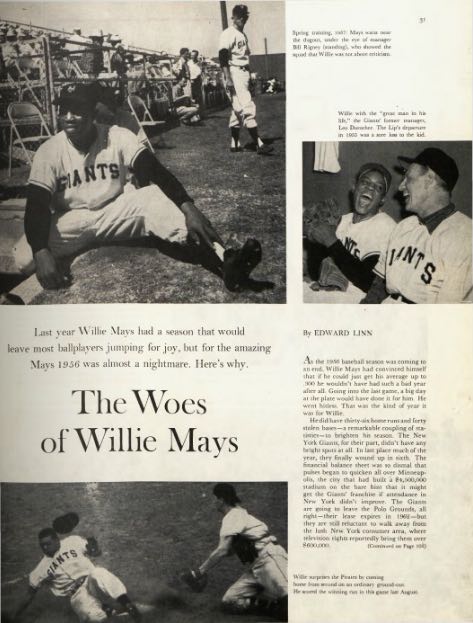
Unwanted: A Teenage Memoir of Japanese Internment
I am a member of a once despised minority group, American Japanese, who spent three-and-a-half years incarcerated in an American concentration camp during World War II. Although that ordeal ended 72 years ago, the impact of that experience on my life and its broader implications for American society resonate deeply to this day.
At the beginning of the war, roughly 10 percent of the adult “alien” men on the West Coast (Japan-born persons being ineligible for citizenship) were picked up by the FBI as potentially dangerous and interned by the Justice Department, effectively robbing the community of leadership. We had been under surveillance for quite a while, and these men were singled out. My father, who was an alien, was not picked up, though many of our friends were. None ever were convicted of a crime or act of sabotage, though many were held for years in captivity.
I was a U.S. citizen by birth, but the distinction meant nothing at the time. My entire family — my parents, two sisters, and I — was sent to Poston in southwestern Arizona, geographically the largest of the 10 War Relocation Authority (WRA) camps where American Japanese were held. At the time, I had just turned 12. By the time we were permitted to leave, I was 15.
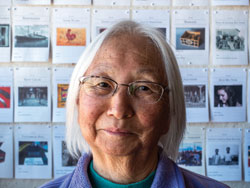
Photo by Dave Izu
We, along with approximately 120,000 others, spent the better part of four years in desolate areas where we were monitored, our movements restricted. We ate in mess halls, and our tar-paper barracks were so flimsy I remember wind and dust storms so strong that rooftops were torn off, debris flying around like crumpled paper.
Perhaps even more of a shock to me than the prison-like conditions was the fact that for the first time in my life, I was living totally surrounded by others of Japanese descent. In my early school years, most of my classmates were white, with a scattering of Mexican-American kids. Although I was one of the few American Japanese in my small town, I never experienced any prejudice there. But at Poston, my farm upbringing contrasted sharply with the sophistication, manners, and clothes of the American-Japanese kids from Los Angeles and other cities.
Here we were, all locked up together, doing our best to be “normal” teens. My mother disapproved of the camp’s faster growing-up process, driven by the city kids. She wasn’t sure about my going to the parties and dances that were a big part of teen life at the camp, and she did not want me to have a brassiere or wear makeup. I missed my white classmates, my home, my town, and my less-pressured life. I felt like an ugly duckling.
We had the trappings of society like schools, jobs, a camp government, a police and fire department. My father did some woodcarving while my mother took sewing lessons, making our dresses. I spent a lot of time reading books from the library. But life was far from normal. The usual social hierarchy was turned upside down, with the elders stripped of power and the young freer to pursue their interests.
It was the pettiness of life in camp that got to me. Almost every aspect of everyone’s life was known to all, and this promoted a culture of gossip and rumor mongering, with whispers and speculations about others filling our time. The meanness, the nastiness exhibited, the way we picked on one another, was an ugliness I hadn’t known before. Of course, it was a manifestation of the cramped living conditions, the forced idleness, and the insecurity of our situation.
A group formerly known for hard work and pride in our accomplishments was reduced to committing little acts of rebellion aimed generally at the government and administration who were oppressing us. People “stole” wood scraps to make furniture and pilfered food from the mess halls. Many did not feel that manual work was worth doing and slacked off, held strikes, and quit their “jobs.” My father “borrowed” a tractor and took a mob of kids to the Colorado River, a couple of miles from the camp.
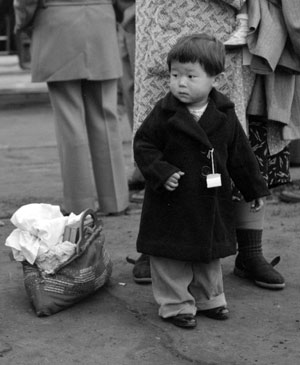
Photo from The National Archives and records Administration
I was too young and naive to understand the bigger picture, but the smaller world I inhabited was beset with contradictions. In eighth grade, a white schoolteacher from Massachusetts ordered us to memorize a Marc Antony speech from Shakespeare’s Julius Caesar. “Friends, Romans, countrymen, lend me your ears,” it began. “I come to bury Caesar, not to praise him. The evil that men do lives after them; The good is oft interred with their bones.” We labored mightily to master those lines and dozens more. But, alas, most of us had trouble doing it, and she castigated us as ignorant, lazy know-nothings.
There were those, particularly older men, who listened to Japanese propaganda broadcasts on smuggled-in radios. Reports of Japanese victories would elicit some cheers. Clumps of men would discuss the latest “news,” sneering at those who didn’t believe, severely criticizing those who remained loyal to the U.S.
Our community was caught up in this international war at a particularly sensitive period. My parents’ generation was still culturally old country. Some, like my mother, never learned to speak English. Their children, including me, were rapidly becoming Americanized. I joined the Girl Scouts and edited the junior high newspaper, The Desert Daze.
In prewar times, it was customary to send children to Japanese school because many believed that eventually they were going to return to their home country. In some places, it was a Saturday-only class, but in my case, we attended an hour of Japanese lessons each day, after American school, and our teachers were brought from Japan. I perfected my calligraphy and reading and writing, but the authoritarian style and emphasis on obedience went against what we were learning in the American school. Even though most of us spoke Japanese at home with our parents, we weren’t interested in it. English was becoming our main language.
These intergenerational conflicts, typical of the American immigrant experience, intensified in the camp. In the beginning, because no Issei (immigrant generation) were allowed any leadership roles in the camps, the block managers and elected members of the camp councils were all young people who had been born on American soil. This powerlessness of the older men was manifest in continuous grumbling about how callow and ill-prepared for leadership the young were.
A call by the Japanese American Citizens League (composed of young men and women who acted as the liaison between the people and the government) to allow young men to serve in the American military to prove their loyalty provoked intense conflict. I had no brothers, but I know that my parents thought that to send our youth to fight for this country, the very country that had imprisoned us, was absolutely unacceptable. I had cousins who “resisted,” refusing to comply with draft orders, and I also had an uncle who served as an officer in the Army, fighting in Europe.
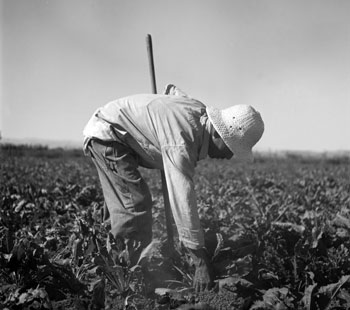
Russell Lee/Library of Congress
These divisions in the camp were reflected in my family. Several years into our incarceration, my father decided that he would apply for repatriation. He had had enough of the mistreatment, feeling that prospects would be better in Japan, where the family had some property. I was astounded and angry. America was my home, and I knew that I was not Japanese. I had no interest in going to Japan. I’d seen enough of the patriarchal, authoritarian style of Japanese society in my own family and others to know that I didn’t want to be a Japanese woman, subservient and under the control of men.
I fought with my parents, even writing letters to magazine editors, but nothing I did would change their minds. As the war wound down I watched as friends left, moving to eastern parts of the U.S. and then back to the West Coast. I was feeling trapped. But when Japan was defeated, my father learned that there was nothing to go back to. He changed his mind and we resettled in Oceanside.
For the rest of my father’s life, we never talked about the camp experience in a serious way. It was too painful. He started farming again but wasn’t very successful. Two years later my mother died of bleeding ulcers. My father became more passive and quiet.
For my part, I was relieved that the ordeal was over and determined to put it out of my mind. I went to college, married a white man, raised a family, lived mostly in white society. I protested the Vietnam War and was active in the civil rights movement. And in the course of these activities, I began to think about my own background.
The wars against Korea and Vietnam made me very aware of American attitudes toward Asians, and the topic of camp came up from time to time. I ran into a therapist at a party who questioned me about my experience, and I brushed it off as not very important. But she pressed on, telling me how formative those early adolescent years were, that I should reexamine those times. This stuck with me, and when a movement for redress began to take shape, I joined in and worked at the legislative level and as a named plaintiff in a court case that went to the Supreme Court.
I learned that the most damaging event that occurred in the camps was a so-called “loyalty questionnaire” administered in 1943, mandatory for everyone 17 and older. It was used to separate the “loyal” from the “disloyal.” It was a poorly designed instrument, resulting in divided families, friends. On the question of agreeing to serve in the American military, to say no was to automatically designate “disloyalty.” My cousins said no and were charged with being draft dodgers. A sympathetic judge fined them one penny.
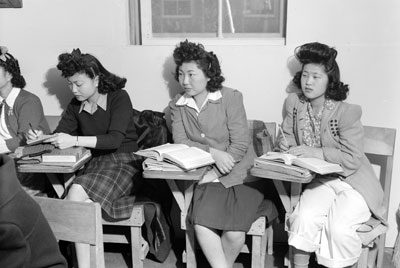
After the government turned the camp at Tule Lake into a segregation center for all “disloyals” and troublemakers, I watched friends loaded onto trucks to be taken there. By the flimsy logic of the day, our family should have been sent there as well — I never learned why we were not. Perhaps a fortunate oversight kept us out.
The government seemed hell-bent on tarnishing all of us as aliens — and enemy aliens at that. How could we remain “loyal” to a country that had held us captive for years, impoverishing us in so many ways? How were we to
respond to these humiliations and victimization? We were expected to disallow our Japanese heritage and submit to the demands of our captors. And we did. But it left us with a badly damaged community, an ever-present split between the “loyals” and “disloyals,” and a deep understanding about how vulnerable we were.
Ironically, we were very good at adapting and melting into the American middle class, earning the label of “model minority.” In my own case, I lost my primal language, distanced myself from the American-Japanese community, and for many years didn’t look back. We paid a heavy emotional price, and the issue of identity has always dogged us: Can we truly be American?
It’s been a long time since World War II, and one would think that Poston would be a fading memory, but it is not. I have made pilgrimages to Tule Lake, seeking a better understanding of our history. Though I have spent my years in white society and my children are half white, I am certain that given particular circumstances, I could be targeted again for my political views, ethnic background, for my religion or being a member of a group identified as other.
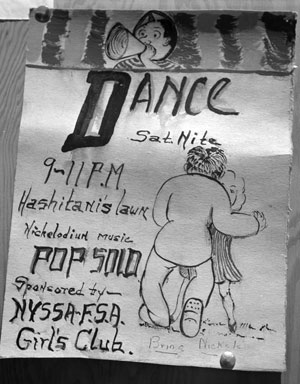
I am not bitter, but I remain quite angry. I am a liberal, a believer in equality, but I am also a cynic. I don’t think that our Founding Fathers really meant to extend equality to everybody, but the words and sentiments remain part of our Constitution. The struggle for our ideals continues, and it is necessary to remind us about what happened to me and 120,000 other Americans, because without that memory, it could easily happen again.
Chizu Omori is a freelance journalist and co-producer of the documentary Rabbit in the Moon with her sister Emiko Omori, chronicling the experiences of Japanese Americans in WWII internment camps. This essay is part of What It Means to Be American, a partnership of the Smithsonian’s National Museum of American History and Zócalo Public Square.
This article is featured in the May/June 2017 issue of The Saturday Evening Post. Subscribe to the magazine for more art, inspiring stories, fiction, humor, and features from our archives.
Originally published at Zócalo Public Square (zocalopublicsquare.org).
Happy Birthday, Count Dracula!
Count Dracula lives — at least his legend does. Since his first appearance in Bram Stoker’s novel, Dracula, in 1897, he has continually scared generations of readers and moviegoers for 120 years.
Dracula is the most successful of a long line of vampires. His literary forebears stretch back to the vampires that appeared in stories and poems of the early 1700s. But it is Count Dracula who has become the quintessential vampire in the popular imagination.
Stoker was inspired to write his novel by an 1885 essay about the superstitions of Transylvania. It described how, according to legend, the vampires of central Romania lived, bred, and were killed.
Stoker also drew on the stories of Vlad Dracula, a ruthless prince of the Wallachia region, which later became part of Romania. The famed 15th century warrior-prince earned the unpleasant title “Vlad the Impaler.”

The personality of Count Dracula, however, was based on the famed actor Henry Irving. Stoker was Irving’s personal assistant, and he lived in awe and dread of the Victorian-era superstar. In Stoker’s book, he gives the count the austere, haughty, manipulative manner that Stoker endured in his work with Irving.
Dracula was adapted for film in 1931. The count was portrayed by Hungarian-born Bela Lugosi, who gave him a convincingly foreign and appropriately creepy character. Lugosi had successfully played the count on Broadway, but his movie performance was enhanced by atmospheric scenery, dramatic lighting, and close-ups of Lugosi’s expressions. The actor’s heavy Hungarian accent became so closely associated with the character that it is still instantly recognizable, even in a bad imitation.
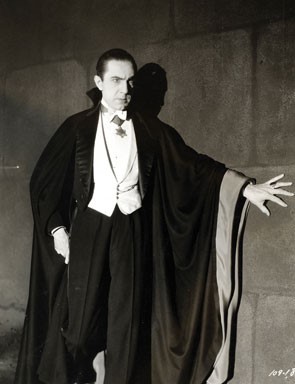
Stoker never enjoyed financial success from Dracula. But the critics praised it, as did the Saturday Evening Post’s reviewer in 1900, the year after Dracula’s American publication.
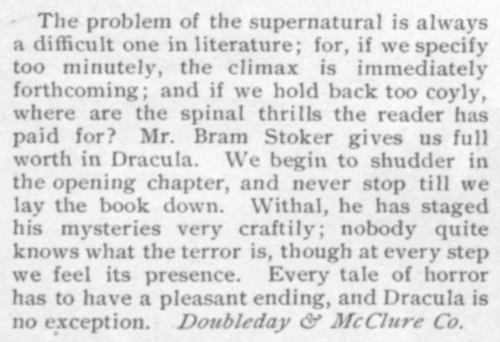
In Stoker’s book, the count hailed from Transylvania, a region in central Romania. The book and movie have made it undoubtedly the most famous of all Romanian regions but have forever linked it to the Dracula legend.
Dracula’s significance to the region was lost on Transylvanians during the communist era, from 1944 to 1989. In 1965, Post contributor Gene Smith traveled there to visit the setting of Bram Stoker’s book. As he learned, there was little room for such bourgeois fantasies. When Smith asked his tour guide what she knew about Count Dracula, she shocked him by asking, “Who is Dracula?” When he told her, she dismissed such a silly notion. “We have no counts in the Romanian People’s Republic.”
Today, Romania is a sovereign state in the European Union. Freed from communist restraint, the locals are ready to cash in on Dracula tourism. It’s nice to know the count is welcome in his hometown in time for his 120th birthday.
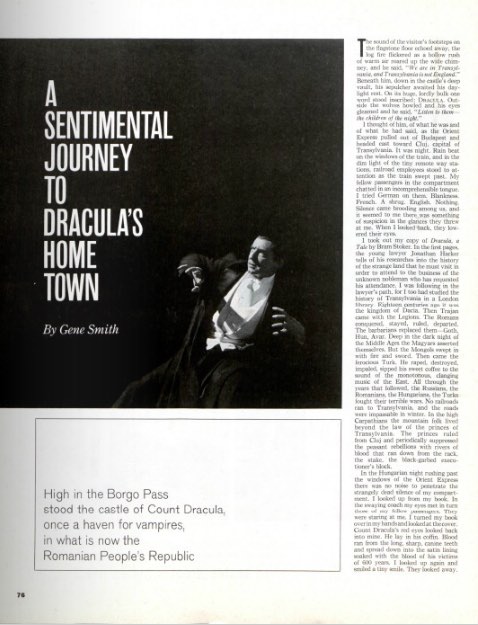
Featured image: Wikimedia Commons
News of the Week: Roger Moore, the Revenge of Print, and the Return of the Bride of Frankenstein
RIP Roger Moore, Dina Merrill, Anne R. Dick, and Marsh McCall
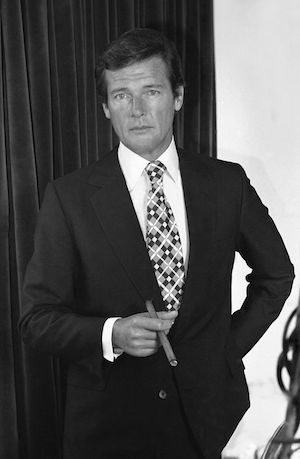
Here’s a great story from a fan that illustrates the type of person Moore was.
Dina Merrill was an actress and philanthropist (she was the daughter of E.F. Hutton and Post cereal heiress Marjorie Merriweather Post), appearing in such movies as Desk Set, Operation Petticoat, BUtterfield 8, and The Player, as well as TV shows like To Tell the Truth, Murder, She Wrote, and Batman. She passed away Monday at the age of 93.
Anne R. Dick was a jewelry-maker, publisher, and writer who was also a major inspiration in the writings of her husband, Philip K. Dick, author of Do Androids Dream of Electric Sheep? (which was turned into the movie Blade Runner), The Man in the High Castle, and many other books and stories. She wrote a memoir of their time together, The Search for Philip K. Dick, and was about to publish her first novel. She died in April at the age of 90.
Marsh McCall started his TV career as a writer on Late Night with Conan O’Brien and went on to write for such shows as Just Shoot Me! and The Naked Truth. He was also a producer on Tim Allen’s Last Man Standing and the Full House reboot, Fuller House, and co-created My Big Fat Greek Life. He died Sunday at the age of 52.
Print Books Are Back!
I prefer print books over e-books. It’s not that I’m a Luddite and don’t want to get involved with electronic versions of books — hey, I have the Kindle app! — it’s just that I prefer the look, the feel, the history, even the smell of the printed page. Honestly, I spend so much time in front of screens already. I’m always looking for a way to get away from them, and print lets me do that.
It seems a lot of other people like them too, as this piece at The Guardian explains. E-book sales reached a high in 2014 but ever since then have seen their sales drop. In fact, last year, sales dropped 17 percent. It’s also interesting to see that while many big bookstore chains have failed or aren’t doing too well, independent bookstores are doing better.
I don’t think e-books are going away, leaving us in a world where just print books exist — digital is still where we’re headed — but I think there’s a real future for print that goes beyond just being a niche product that only collectors are still interested in. Print books and bookstores are here to stay.
The American Writers Museum
Many of the books you’ll find in those bookstores (boy, that’s a tortured segue) were written by classic American writers, and now you can go to one place that celebrates their work. The American Writers Museum in Chicago opened recently and showcases the work of such writers as Mark Twain, Herman Melville, F. Scott Fitzgerald, Jack London, Shirley Jackson, John Updike, Kurt Vonnegut, David Foster Wallace, and even I Love Lucy writer Madelyn Pugh Davis (who, by the way, went to the same high school as both Kurt Vonnegut and former Saturday Evening Post owner Beurt SerVaas).
It won’t surprise you that, yes, many of those writers wrote for the Post, including Fitzgerald, London, Jackson, and Vonnegut.
Journalists Aren’t Normal, Study Shows
No, this isn’t another story about so-called fake news. It’s about a scientific study that shows journalists’ brains aren’t the same as everyone else’s.
Neuroscientist Tara Swart, in association with the London Press Club, interviewed and tested 40 journalists from various newspapers, magazines, and websites and found out that not only do their brains show a lower-than-average level of functioning than the average population, they’re also more prone to dehydration, to not getting enough exercise, to an inability to “silence the mind,” and to self-medicate with caffeine, sugary foods, and alcohol.
Every single writer and journalist will tell you that those findings are absolutely true.
The study wasn’t all bad news. It also showed that journalists did very well with things like “abstraction” (the ability to deal with ideas rather than events) and “value tagging” (the ability to figure out what’s important or what has meaning). It just so happens that, to many journalists, those important things are caffeine, sugary foods, and alcohol.
Frankenstein and The Mummy and The Creature, Oh My!
Universal Studios wants to make a monster movie universe, a series of connected movies, much like all the Marvel movies are connected and part of the same universe. And they’re going back to their roots to create that universe.
With the launch of The Mummy (with Tom Cruise) on June 9, the studio is well on its way to forming what is being called a “Dark Universe.” Other movies in the series will include The Invisible Man (with Johnny Depp), Van Helsing, and new versions of Frankenstein (with Javier Bardem) and The Bride of Frankenstein.
I hope they don’t ruin these movies with too many special effects when it comes to the actual monsters. They have to be guys in suits, right? That’s the only way these movies will work. Part of the charm of the original Creature from the Black Lagoon was that we knew it was a guy in a creature suit swimming around. I don’t want to see a CGI Creature or Frankenstein.
Finally, You Can Drink a Latte out of an Avocado
I didn’t realize that drinking something out of a food was a thing, but then again, I’m just getting caught up on fidget spinners and Harry Styles.
The Truman Cafe in Melbourne, Australia, is currently serving the Avolatte, which combines two Australia favorites, lattes and avocados. It started as a joke, but now it has taken off and everyone is talking about it.
It probably won’t catch on, and soon we’ll be on to the next fad. Maybe my invention will become popular: drinking Diet Pepsi out of a hollowed-out tomato. I call it The Tomepsi.
This Week in History
Arthur Conan Doyle Born (May 22, 1859)
The creator of Sherlock Holmes contributed several articles to The Saturday Evening Post, including “The End of Devil Hawker,” a nonfiction piece about the wrongful conviction of a half-English, half-Indian man, George Edalji.
Dunkirk Evacuation Begins (May 26, 1940)
Also known as Operation Dynamo, the evacuation of Allied troops from Dunkirk’s beaches and harbor on the French coast took place between May 26 and June 4.
Director Christopher Nolan’s new movie about the event, Dunkirk, opens on July 21. Here’s the trailer:
This Week in Saturday Evening Post History: First Cake Cover (May 21, 1955)
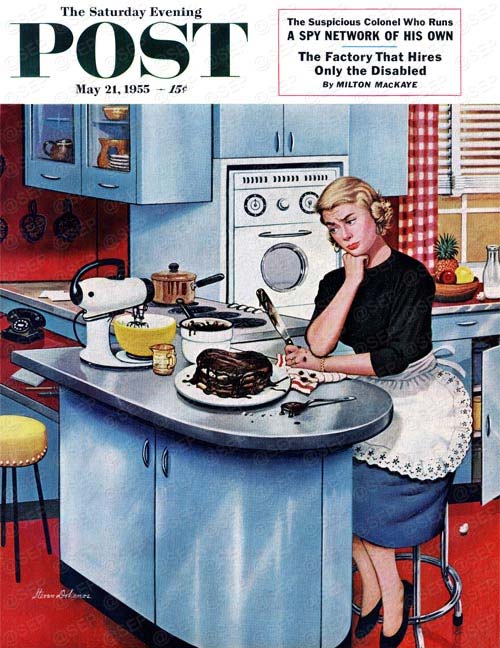
I love that kitchen. I want to live in a time and place where that kitchen exists. This cover is by the great Stevan Dohanos, and it’s so well done you don’t even have to see the date on the cover to know it’s from the 1950s. But it proves you can have all of the most modern appliances in your kitchen and they still won’t guarantee you’ll make a great cake. Even the oven looks shocked at how it turned out.
National Cherry Dessert Day
Today is the day when you can officially eat cherry-inspired desserts, such as these Cherry Oatmeal Cookies or this Cherry Dream Cake. You can also make Mary’s Royal Cherry Trifle. “Mary” is Mary Berry, the tough but fair British food writer and co-host of The Great British Bake Off and The Great American Baking Show.
If you want to pour a latte into one of these desserts, well, I guess I can’t stop you. I don’t think Mary would be too happy about it, though.
Next Week’s Holidays and Events
Memorial Day (May 29)
This Monday isn’t just the unofficial kickoff to summer, the day to fire up the grill and get out the patio furniture and bug spray; it’s also a day to honor our heroes.
National Doughnut Day (June 1)
There are actually two National Doughnut Days (the other is on November 5), but most people consider this day the official day, as this Mental Floss piece explains. But feel free to celebrate both if you really like doughnuts.
Top 10 Late Spring Reads
Every month, Amazon staffers sift through hundreds of new books searching for gems. Here’s what Amazon editor Chris Schluep chose especially for Post readers this spring.
Fiction
Into the Water
by Paula Hawkins
The author of the mega-hit The Girl on the Train is back with more psychological suspense in this new novel about a town and a river that hold forgotten secrets — plus a few discarded bodies.
Riverhead Books
Camino Island
by John Grisham
Taking time off from publishing legal thrillers, Grisham has written a cat-and-mouse beachside caper about stolen F. Scott Fitzgerald manuscripts. This is a great read by a master of his craft.
Doubleday
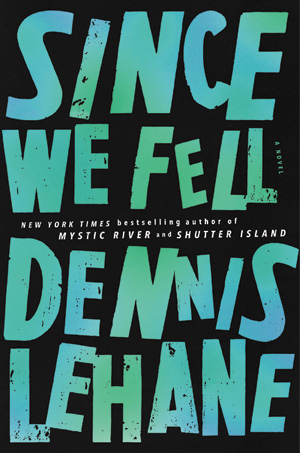 Since We Fell
Since We Fell
by Dennis Lehane
The Shutter Island author’s latest is the story of a life and a marriage unraveling as a woman is drawn into a conspiracy that she didn’t go looking for and might not have the strength to escape.
Ecco
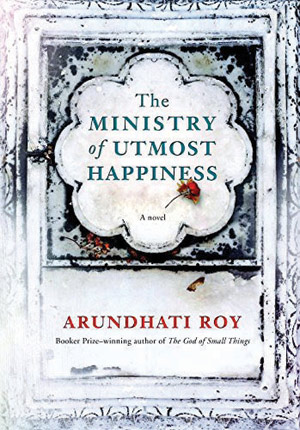 The Ministry of Utmost Happiness
The Ministry of Utmost Happiness
by Arundhati Roy
From the Booker Award-winning author of The God of Small Things comes a tale of intertwined characters in search of meaning, love, and safety against the backdrop of the Indian subcontinent.
Knopf
 The Identicals
The Identicals
by Elin Hilderbrand
Old grudges bubble to the surface as identical twins struggle to confront a family crisis. The twins are so alike and yet so different, and they must decide which distinction matters more.
Little, Brown and Co.
Nonfiction
 Astrophysics for People in a Hurry
Astrophysics for People in a Hurry
by Neil deGrasse Tyson
Even if you’ve never hoped you could understand the nature of space and time, Neil deGrasse Tyson answers the questions of the cosmos in a witty and easily digestible style that keeps you turning pages.
W.W. Norton
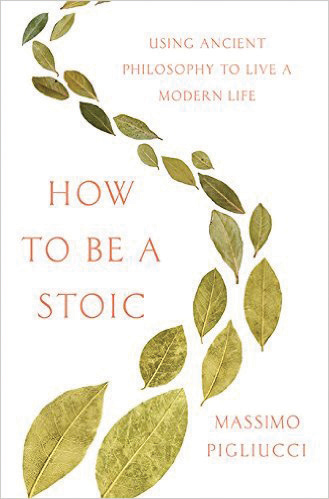 How to Be a Stoic
How to Be a Stoic
by Massimo Pigliucci
Stoicism is hot right now, and in this book, Pigliucci argues that the ancient philosophy that has long been associated with suffering is really about learning how to differentiate what you can, and can’t, control in your life.
Basic Books
by Mary V. Dearborn
This is the first biography of Hemingway in 15 years — and the first written by a woman. It draws on new material to give the richest and most nuanced portrait yet of one of America’s greatest writers.
Knopf
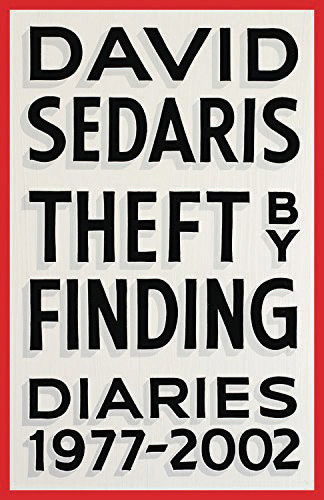 Theft by Finding
Theft by Finding
by David Sedaris
Drawn from decades of diary entries, Sedaris’ latest collection reveals a unique view of the world from a man who turned a grim start as a drug-abusing dropout into a funny, generous, and uncomfortable career as one of our greatest modern observers.
Little, Brown and Co.
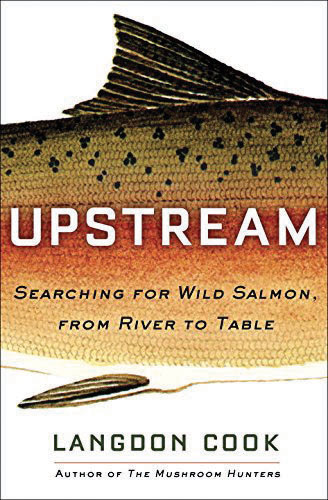 Upstream
Upstream
by Langdon Cook
Through an exploration of the natural history of his subjects, Cook sets readers at the essential intersection of man, food, and nature in a portrait of the all-important salmon and the places where and people to whom salmon matter most.
Ballantine Books
Ice Out
From the three-second mark on the tape cassette:
“For the record, my name is Brook Tyler, and I’m a detective sergeant with the New Hampshire State Police Major Crimes Unit. Today’s date is Monday, March 27, and the time is 9:05 a.m. With me in this meeting room at the State Police offices on Hazen Drive in Concord is Detective Laura Gadsen and Miriam Wilson, resident of Montcalm, New Hampshire.”
[[Pause as papers are shuffled and the microphone is moved.]]
Q. Miss Wilson, are you prepared to answer my questions?
A. Please, call me Miriam.
Q. All right, Miriam. You’ve been read your Miranda rights, you’ve reviewed them on a handout, and you’ve check-marked and signed each paragraph, and the bottom of the page. So you are fully aware of your rights under the law, correct?
A. Yes.
Q. And you know that at any point, you can halt this questioning, and ask for a lawyer?
A. Interrogation.
Q. Excuse me?
A. Detective Sergeant Tyler, let’s not fool around or play games. This is an interrogation, that’s all, and yet I’m still prepared to answer your questions. So let’s not play around, shall we?
[[Pause]]
Q. Miss — I mean, Miriam, how long have you resided in Montcalm?
A. More than 20 years.
Q. And prior to that?
A. Alexandria, Virginia. I worked for a number of years as a transitional office employee for the government, and I was offered an early retirement, and I took it. However, I was born in Montcalm before I started my career. I really looked forward to coming back home and took the opportunity when I could.
Q. And you ran a business in Montcalm?
A. Correction, I still do run a business … even with the, ah, unfortunate circumstances I find myself in.
Q. And what kind of business is it?
A. You know exactly what kind of business it is.
Q. Please, Miriam, could you just answer the question?
A. No need to get snippy, Detective Sergeant … Anyway, my business is Miriam’s Web. It’s a knitting supply shop. The only one within an hour’s drive in that part of the state.
Q. And in addition to owning this store, you were also president of the Lake Montcalm Chamber of Commerce.
A. You are correct.
Q. And what is the function of the Lake Montcalm Chamber of Commerce?
A. For real?
Q. Miriam, please.
A. Oh, for heaven’s sake, three minutes on the internet and you can see everything we do on our website … but to answer your question, we help promote the businesses around Lake Montcalm and in the village, advertise in various tourist publications, and fund a scholarship for both a male and female student from Montcalm Regional High School.
Q. And how long have you been president of the Chamber of Commerce?
A. Four years.
Q. I see … now, if I can change the subject for a moment … are you aware of a gentleman named Cornelius Pope?
A. No.
[[Pause as voices are raised and there’s crosstalk]]
Q. Miriam …
A. I’m telling the truth. I don’t know of a gentleman named Cornelius Pope. However, I did know of a true jerk named Cornelius Pope. I can tell you that.
[[Pause]]
Q. Go on, Miriam. Please tell us how you came to know Mister Pope.
A. Do you want the long story or the short story?
[[Pause]]
Q. The true story.
[[Laughter]]
A. I’ll tell you the short story, otherwise we’ll be here a week. Pope was a retired professor from UNH. One of those granola-munching types, you know? Ready to protest at the drop of a hat, or announce a boycott of chicken or veal or something silly like that. He opened up a bookstore and café down by the town docks. He called it the Half Moon Café, but we all called it the Communist Café. I mean, we all knew that a bunch of his customers would sneak out back and smoke —
Q. That’s enough, thank you. And wasn’t there a time when Mister Pope became active in the Chamber of Commerce?
A. He did.
Q. And is it fair to say that the two of you had a … contentious relationship?
A. A what?
Q. A contentious relationship. That you didn’t get along.
A. Oh, we certainly didn’t get along, but it wasn’t my fault. I wanted to be friends, but Pope … he had another agenda. He wanted to … make a difference, bless his heart. But I wouldn’t say we were that contentious.
[[Pause]]
Q. Miriam, we’ve reviewed two years’ worth of minutes from the Chamber of Commerce. There were a lot of arguments, name calling, and so forth.
A. Really? Well, if it’s in the minutes, it must be true.
Q. And there were a number of letters he wrote to the Montcalm Gazette, criticizing your leadership of the Chamber of Commerce.
A. That was his right, of course, to publicize what a moron he was.
Q. Miriam, if I may skip ahead —
A. Oh, please do. After all, you’re in charge here.
Q. Thank you. Miriam, I’d like to talk now about the Ice Out Festival.
A. Go right ahead.
Q. Could you explain what the Ice Out Festival is about?
A. Certainly. After all, it was my idea … and I ran it successfully for a number of years before Professor Pope showed up with all his new ideas. You see, by the time spring comes, a lot of us around here are ready for more daylight, warm weather. We have a serious case of cabin fever. So I thought a little festival marking when the ice officially breaks up on Lake Montcalm — that’s called “ice out” — would be a fun way to mark the end of winter. It was quite the success.
Q. Mister Pope didn’t think so.
A. Pope was from away. I didn’t care for his opinion.
Q. But his opinion was that the Chamber and the town could do more. More publicity, advertising, contests, food carts … make it a real festival.
A. A real circus, you mean.
Q. But from the minutes and from reviewing the local newspapers, it seems Mister Pope won the day. Plans were put into place to expand the festival. And you were opposed.
A. I was. It didn’t fit the town, didn’t fit our history. Like I said … it was a circus.
Q. And you resented that?
A. Wouldn’t you?
Q. Miriam, please answer the question.
A. Of course I resented it. I resented it very much. He was from away, he was very bossy, and he didn’t want to fit in. He wanted to run things.
[[Pause]]
Q. All right. Miriam, could you explain how ice out was noted?
A. Noted?
Q. How people knew when the ice had officially broken up for the spring.
A. Oh, I see. You should have been clearer in your questions. Well, what we’ve done for years past, is that we go into the center of Lake Montcalm and secure a buoy that’s eventually frozen in place when the lake starts to freeze. Then, one of those … highway flares is attached to the buoy, and is also attached to the ice. When the ice starts breaking up around the buoy, the flare is lit off, and then you have ice out.
Q. But isn’t that something hard to predict? I mean, you could schedule the festival and ice out wouldn’t occur at the same time.
A. That’s what I said! But Pope said, so what. What difference would it make? And I said it would make a hell of a difference, that the good people coming to the lake, if they didn’t see the flare going off, they would think they got cheated. And Pope said, well, they had a chance to get drunk and have fun, so there you go.
Q. And you also resented that?
A. I certainly did.
[[Pause]]
Q. Miriam?
A. Still here.
Q. Miriam, isn’t it true that Cornelius Pope went missing last fall?
A. I suppose he did.
Q. And did that concern you?
A. Not at all.
Q. And he remained missing all this past winter, correct?
A. Yes.
Q. In fact, he remained missing right until your town’s Ice Out Festival last week, correct? Where by chance, the flare lit off the Sunday morning of the festival?
A. Funny how that happened. I guess Pope might have been right all along.
Q. And something else happened later that day, am I right?
A. Of course you’re right. Or why else would I be here?
[[Pause]]
Q. Miriam, when a reporter from the Montcalm Gazette motored through the broken ice to get a close-up photo of the buoy and discharged flare, something else was there, wasn’t it?
A. That’s what the papers said.
Q. Yes. What were there were the remains of Cornelius Pope. Apparently, he had been dead all that winter, fastened to the buoy.
[[Pause]]
Q. Miriam, do you have any idea of how Mister Pope’s body ended up attached to the buoy?
A. I do.
[[Pause]]
Q. You do?
A. Of course. I put him there.
[[Pause]]
Q. Miriam …
A. Still here.
Q. How in the name … how did he end up there?
A. I motored him out at night … a very clear night, nice full moon, I could see everything though it was damn cold, you knew ice would start forming in a few days … and I got to the buoy, I fastened him to the buoy’s chain with another chain, and with three cement blocks, I tossed him overboard. And I motored back. And then we got a cold front move in and the ice started forming …
[[Pause]]
Q. Didn’t he put up a fight?
A. Excuse me?
Q. Didn’t he put up a fight when you tossed him into the water?
A. Dear me, no.
[[Pause]]
Q. Was he unconscious?
A. Oh, no, he was dead. Quite dead, in fact.
[[Pause]]
Q. Did you murder him, Miriam?
A. No, I did not.
Q. Then how …
[[Pause]]
A. Oh, didn’t I make it clear? Pope committed suicide.
[[Pause]]
Q. Say again?
A. Pope killed himself.
Q. He … did?
A. Yes, he did. Right in my kitchen.
Q. How … I mean … when … I …
A. Shall I tell you the whole story?
Q. Please do.
[[Pause]]
A. Well, he came to me out of the blue that night, wanting to make apologies. He said things had gotten out of hand and wanted to make amends. He… he could be charming, I do admit that. So I reheated a nice tuna casserole and we talked and both had a glass of wine, and then… he got weepy. He said that he and his wife were getting a divorce, he had cheated on her plenty of times with the co-eds, and that the bookstore and café was failing. That he was a failure at everything he did.. and then… well, I couldn’t believe it. He had this little tube and emptied it into his wineglass, swallowed it, and then he just slid to the floor. Dead.
[[Pause]]
Q. And you didn’t call the fire department? Or EMTs?
A. Why? He was dead.
[[Pause]]
Q. And the police? You didn’t call the police?
[[Pause]]
A. A dead man in my kitchen? For real? I didn’t want the scandal.
[[Pause]]
Q. And you thought it would be best to motor out in the middle of the night, fasten his body to the buoy chain, and not tell anyone?
A. That’s right.
Q. But you knew his remains would be found eventually, come spring and Ice Out.
A. Right again, Detective Sergeant.
Q. But… why?
A. Isn’t it obvious?
[[Pause]]
Q. Not really.
A. Oh. You see, Pope, this whole extended festival was his idea. He wanted to make it splashy. Wanted it widely known. And I thought… well, finding his body on the ice-out buoy would certainly do that. I did it in a way of honoring him and his idea.
[[Pause]]
[[Cross-talk]]
Q. Now, wait a minute, wait a minute here…
A. I’m sorry. Who are you?
Q. You know exactly who I am.
A. I’m very sorry, but the older I get, the worse I get with names…
Q. I’m State Police Detective Laura Gadsen, Miss Wilson.
A. Nice to meet you, Detective Gadsen. And you may call me Miriam.
Q. Miss Wilson —
A. Miriam
Q. Please don’t interrupt, Miss Wilson. I was the detective in charge of executing the search warrant at your home and your place of business. And what we found was very interesting.
[[Pause]]
Q. What we found there were hundreds of books, true crime books, mystery fiction. Some with interesting titles, like how to get away with murder.
A. Sorry, I’ve never been one to read those romance novels. I find them dull.
Q. And another thing. Your past work history… you’ve spent time with the FBI, the Secret Service, the Treasury Department… I’m sure you were exposed to many, many interesting examples of crime investigations and forensics. Years worth.
A. Well, I did meet some very interesting people.
Q. I’m sure.
[[Pause]]
Q. All right, Miss Wilson. You’ve told us this… tale of a remorseful Cornelius Pope committing suicide in your kitchen, and of you taking his body out to the lake, to chain it to a buoy and let it rot over the winter… all for announcing his death during the Ice Out Festival. For publicity. To honor his memory. That’s one hell of a story.
A. You know, I do have to agree with you there.
[[Pause]]
Q. Yes, one hell of a story. But let’s look at a simpler story, shall we? A story where for some reason, Cornelius Pope comes to your house. The two of you are alone. A perfect situation for you. Based on your reading, research and work experience, I’m sure you’re aware of a number of poisons that are hard to trace in a victim’s body. Combined that with the fact his remains were immersed in water for several months, it would be nearly impossible to come up with a certain cause of death. It would seem to be the perfect crime, don’t you think?
A. Not really, Detective Gadsen.
[[Pause]]
Q. Miss Wilson, here’s the deal. There’s no way Cornelius Pope came to your house, intent on committing suicide. You got him there on some sort of pretext, poisoned him, and then transported his body out to the ice buoy. You could have dumped in the woods or dumped him in the lake but, no, you wanted a final humiliation, a final revenge. That’s what you did. That’s what really happened. There was no suicide. There was a murder. And you committed it.
[[Pause]]
Q. Miss Wilson, you committed murder, didn’t you?
[[Pause]]
A. Prove it.
End of recording.
Cartoons: Kidding Around
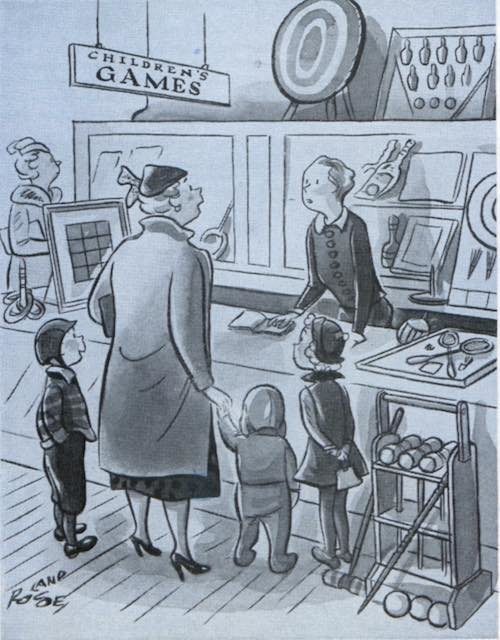
Rose
December 28, 1940
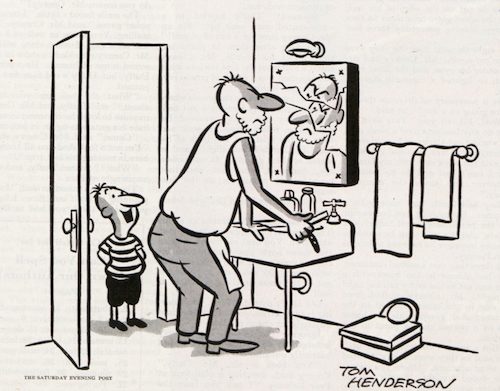
Tom Henderson
December 27, 1947
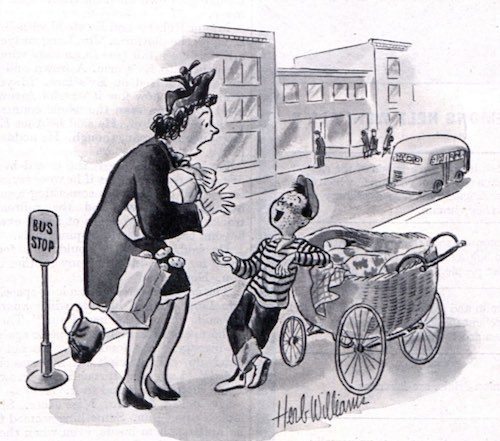
Herb Williams
December 25, 1943

Ken Benner
January 01, 2011
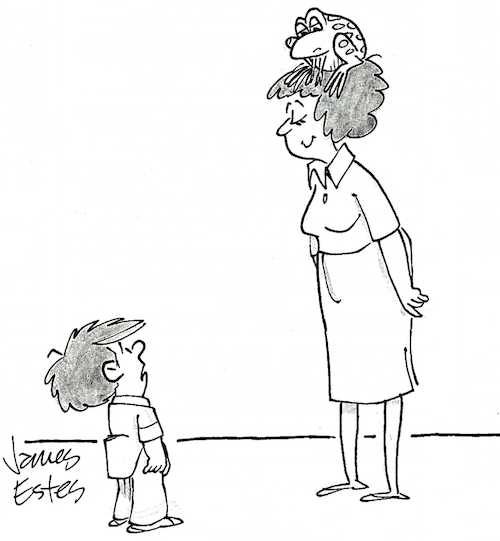
James Estes
March 01, 1995

Randy Glasbergen
January 1, 2003
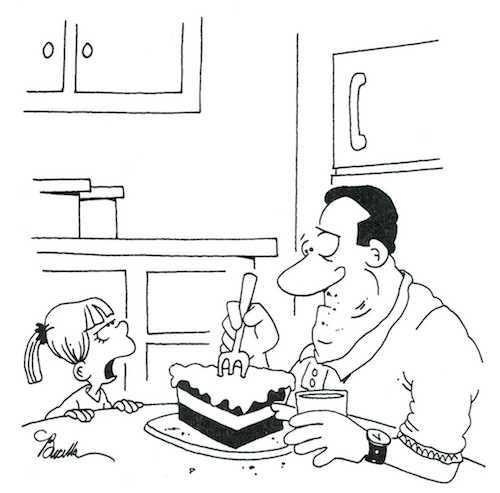
Marty Bucella
March 1, 2003
Have Americans Ruined Memorial Day?
Memorial Day has always had a problem.
Originally called Decoration Day, it started after the Civil War as a day set aside for Americans to place floral tributes on the graves of soldiers who had died serving their country. May was chosen because it was the month when many flowers were in bloom.
Decoration Day was always observed on May 30, which often fell on a weekday. Many had to take time out of their work schedules to visit a cemetery and pay tribute to America’s heroes.
But in 1968, with the name officially changed to Memorial Day, it was moved to the last Monday in May. It became one of five national holidays that, for the sake of convenience, was tacked onto a weekend.
Had Memorial Day been set in another, cooler month or had it not created a three-day weekend, its purpose might be better remembered. But it occurs just as Americans are ready to start celebrating summer. It is the return of the “outdoor season” and is strongly associated with picnics and barbecues. For the young, its meaning can get lost in the euphoria of the end of school.
The concern that the true purpose of Memorial Day has been lost is not a new one. Americans have been complaining for over a century that the day barely honors the fallen.
In 1872, Eliza Connor, a regular contributor to the Post who wrote under the pseudonym “Zig,” observed that Americans were using Decoration Day like a second Fourth of July. Though the Civil War was just a few years in the past, the purpose of the day was already being obscured by parades, brass bands, fireworks, and, worst of all, politics.
Decoration Day
Zig’s Letters
June 29, 1872Decoration Day, May 30, … ought to be a day sacred to all the holy, gentle feelings of mortal nature, sacred to sweet memories and sweeter hopes. A day when strife, malice, envy, and all evil are banished utterly from our hearts, when, for one day, good should fill men’s breasts wholly. I think that is what those who are gone would wish.
But I fear there isn’t very much reverence for the sacred, gentle emotions in us Americans. There isn’t in us very much reverence for anything, I think, or else we should never turn a day set apart for visiting the graves of our dead friends into a Fourth of July. There is that which is absolutely shocking about the way Decoration Day is coming to be observed. I don’t know how it is elsewhere, but here among us such an infernal hullabaloo was kept up all day that you couldn’t hear your own ears. [Zig wrote from Indianapolis, Indiana.]
At break of day the demonish din began. With the very first peep of light, aye, before it, we were affrighted from our slumbers by a thundering shot-gun cannonade right under our very windows. We bolted out of bed as if we ourselves had been shot, wondering in our scared bewilderment, if a New York mob wasn’t coming, or indeed whether Old Nick himself wasn’t after us.
The shot-gun cannonading increased as the morning wore on, every minute being nearer, clearer, deadlier than before. What on earth could it mean? And it was not for two full hours that I remembered, with a blush for my fellow countrymen, that it was the thirtieth of May — a day sacred to the memory of the blessed dead. Later on in the day, they had processions of policemen, secret societies, and brass bands of music, and processions of citizens in carriages, and ladies and citizens on foot, and the Mayor and Council, and wagon loads of young ones, and that sort of thing, for all the world like a Fourth of July. I don’t particularly remember to have heard any popping of torpedoes or explosions of shooting crackers, but I haven’t a doubt that next year they will go off lively, and I dare say fireworks will be added in the evening, and they will have special Decoration Day plays at the theatre, with dead soldiers in the show. It will be very nice, and just like the progressive spirit of Young America.
But the most sacrilegious feature, the most abominably disgusting feature about Decoration Day is that the office-seekers have turned it into a day for electioneering and the firing-off of their accursed political popgunnery. Some despicable ward politician —and there never was a ward politician who wasn’t despicable — invariably gets hoist of the occasion, and spouts his small buncombe at folks till they are sick. It is simply outrageous. The man who played cards on his grandmother’s coffin was guilty of no greater desecration.
I wonder how the dead soldiers like it.
Every year thousands and thousands of dollars are spent on Decoration Day. It is a day for pomp and vanity and show. Foolish people vie with each other in the number and variety of costly flowers which they purchase, much the same as horse-fanciers seek to out-do each other in the matter of fast trotters.
There has been money enough spent in this foolish rivalry to feed, clothe, and educate every destitute soldier’s orphan in the land. And if departed souls ever can behold the scenes of this life again, I know that many and many a brave man who laid down his life for his country, looks sorrowfully upon the roses which garland his grave on Decoration Day. Because his fellow countrymen and women cover his senseless clay with flowers, and leave the children whom he loved to become outcasts and street Arabs. It is really pitiful to remember how much some of the soldier’s children have lost. And if the money which is thrown away every year on useless pomp and show, were spent to educate the orphan children, to train them to noble, virtuous lives, then our beloved soldiers’ graves would be decked with immortal flowers, and Decoration Day would be crowned with garlands which would grow greener with each succeeding year. Again, I think that is what those who are gone would wish.
ZIG.
On this Memorial Day, some Americans will forget to honor the men and women who died in the country’s service. Others will remember but be unable to decorate a military grave. They can still honor the fallen by keeping a sense of gratitude for what the price our soldiers paid to protect our priceless legacy: life, liberty, and the pursuit of happiness.
Featured image: Decoration Day, 1917. (Library of Congress)
Cover Gallery: American Bridges
From San Francisco to Louisville to Pennsylvania, the beauty and grandeur of America’s bridges is on full display in these gorgeous covers.
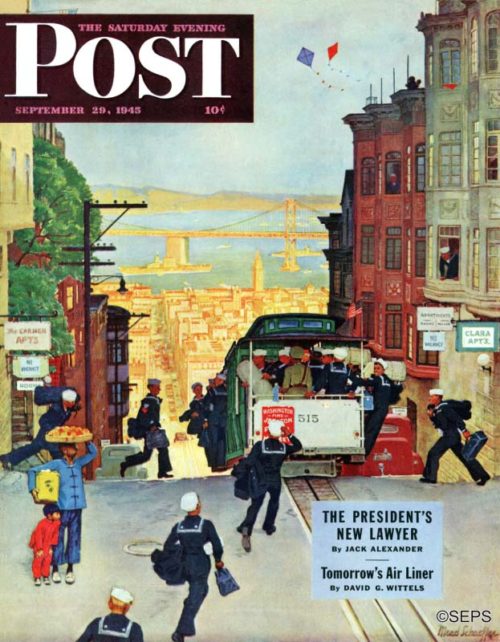
Mead Schaeffer
September 29, 1945
In August of 1945, the city of San Francisco announced plans to dismantle its famous cable car system. The Post was in the thick of the uproar that followed. Mead Schaeffer’s September 29 cover helped “touch off an explosive burst of civic pride” that ultimately saved the cars, as writer Elmont Waite recounts in this article published five months later.
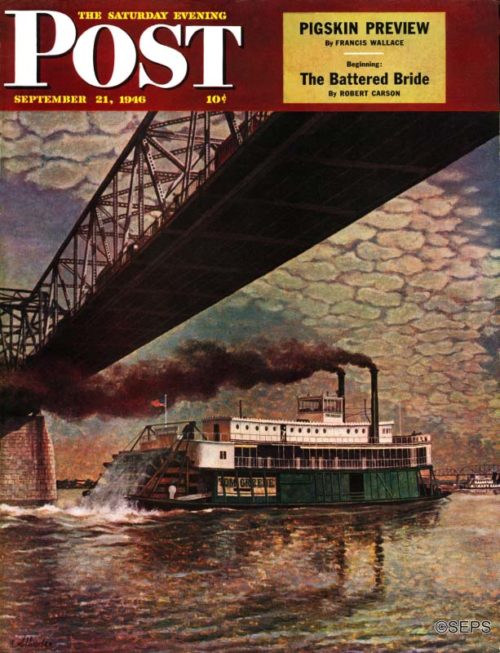
John Atherton
September 21, 1946
John Atherton painted his picture of the stern-wheeler at Louisville, Kentucky, where the Ohio rolls along on its way to join the Mississippi. Atherton enjoyed his stay in Louisville, but lost one of his illusions. A Vermonter, the artist went to Kentucky prepared to find that people there take things pretty easy. He had no sooner taken a preliminary squint at the river boat than a bustling Kentuckian took him in hand and arranged for the artist to work from a barge, which afforded a much better view. While relaxing at lunch, Atherton remarked that the job would take some little time, as he had to do a good deal of wandering up and down the river, in search of the proper site. A second energetic Kentuckian immediately put a car and driver at Atherton’s disposal, so the artist could cover more territory in less time. The motorized painter came back convinced that Kentucky is full of expediters.
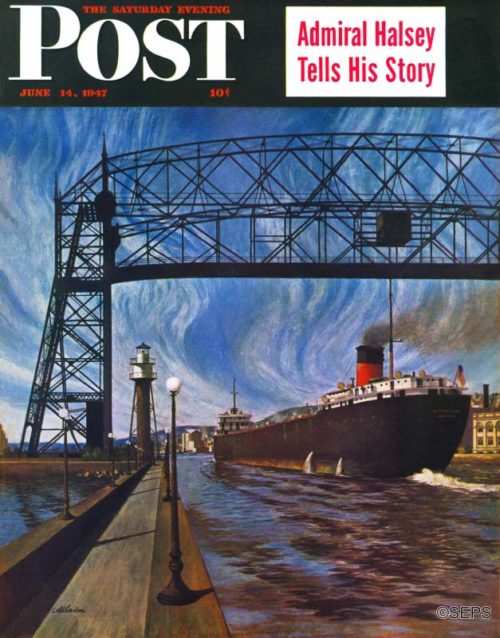
John Atherton
June 14, 1947
John Atherton’s cover painting is a continuation of our family album of American regions. This time he moved north, to the Paul Bunyan country, and thousands will not need to be told that the cover is a view of the husky city of Duluth. This is the ship canal, through which ore boats move out to begin their travels in the Great Lakes. The ore, of course, comes from the great Mesabi Range. Atherton chose a moment when the bridge had lifted to let one of the ore boats pass below. The trip to Duluth is one the artist had hoped for many years to make; he remembered being there as a boy of six, when he was deeply impressed. Not by Duluth’s Bunyanesque role in American industry, however, but with its excellent facilities for sledding.
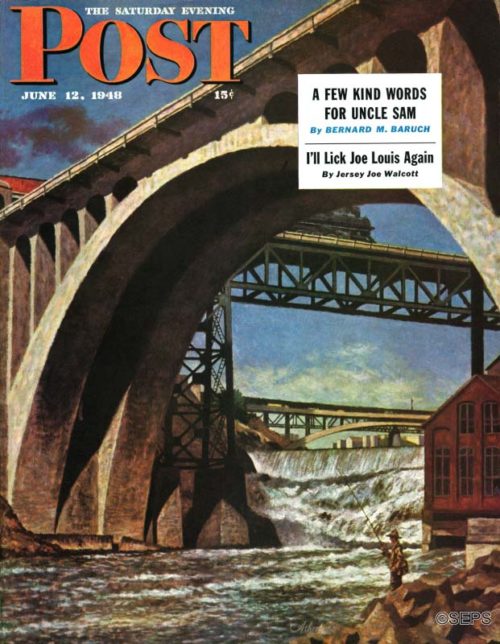
John Atherton
June 12, 1948
John Atherton’s cover painting is another page in our album of American localities; this time the scene is Spokane, and you are looking at the Monroe Street bridge, which is crossed overhead by a railroad bridge. Atherton lived in Spokane in his high-school days, and used to fish at the foot of these falls. In fact, when he needed a model for the fisherman, he dug out a photograph of himself at eighteen. It was the start of a lifelong devotion to fishing, not because Atherton himself had great luck in this river, but because he watched others haul out beautiful fish there—one rainbow trout that weighed nearly ten pounds. Atherton’s grandfather was an early settler and built a flour mill at the falls—the first in that region, Atherton believes.
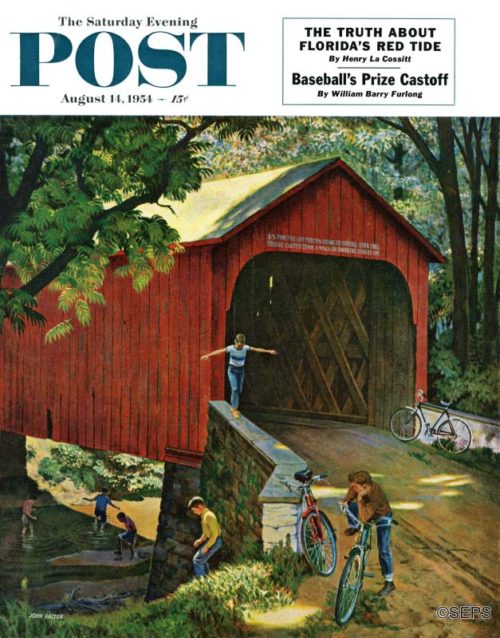
John Falter
August 14, 1954
A lazy summer day, a covered bridge, a crick or creek to play with, and a snake—how can one better define bliss? John Falter painted that bridge from life; its warning of “$5 fine for… smoking segars on” is an old rural Pennsylvaniaism, not a sample of the way the artist himself organizes words.
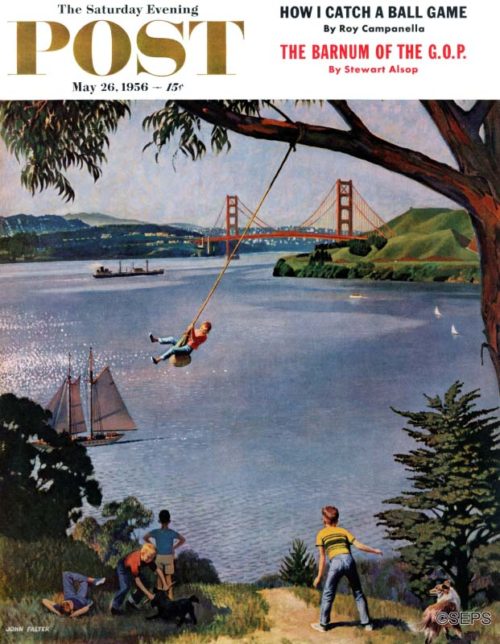
John Falter
May 26, 1956
When John Falter was strolling along Belvedere Island, admiring the grace of Golden Gate Bridge across the azure bay, he happily discovered that kids still relaxed in the mellow old hair-raising way. Falter’s cliffside home was two blocks to the right of his painting.
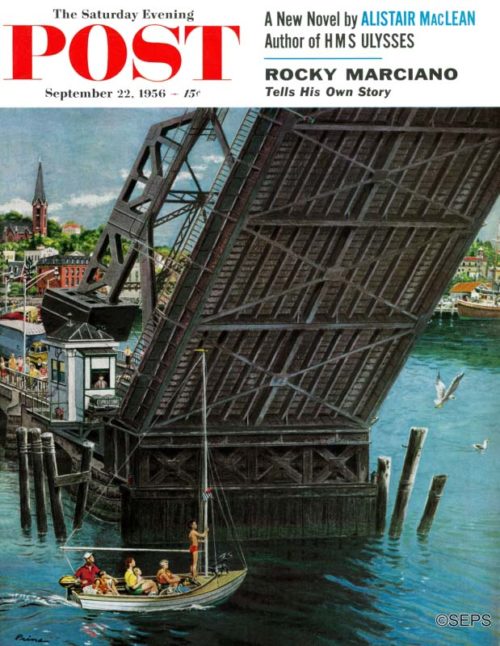
Ben Prins
September 22, 1956
Illustrator Ben Prins sat beside a drawbridge for three hours to watch it move, and it never moved a muscle, nothing wanting to go through but a gull. Finally, the kindly bridge tender, saying he’d better test the thing for shimmies anyway, waited till auto traffic was light and flapped it up and down for art’s sake. As no boats were visible, the motorists must have feared the man had gone on a bender.
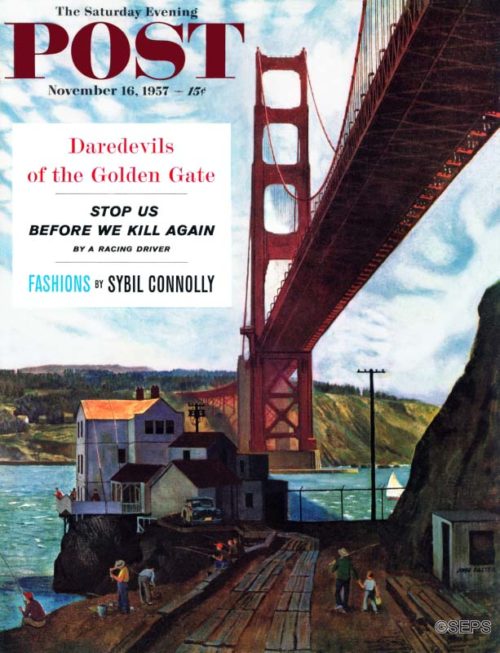
John Falter
November 16, 1957
To the left across the water: San Francisco, plus the New York Giants. The house is a lighthouse and the cables keep it from taking off for a sail someday. John Falter, who said he was something less than a superb sailor, had helped crew sailboats out through the Gate a few times, and usually had been delighted to regain dry land.
North Country Girl: Chapter 1 — Duluth
For more about Gay Haubner’s life in the North Country, read the other chapters in her serialized memoir. The Post will publish a new segment each week.
In Duluth, a tiny dot on the western tip of that great lake Superior, where I had the good fortune to grow up, each season had its own smell. Spring was definitely here when the purple and white lilacs burst forth, their pervasive old lady fragrance signaling that there would be no more snow and it was time to switch out our house’s storm windows for screens, a twice-yearly job my father dreaded. I held the ladder beneath him, trembling as the “Goddamits!” and “This is horseshits!” rained down.
Summer was the sharp green nose-tickle of new-cut grass, which I loved until I was at an age where the lawn-mowing duty fell on me. I was scared to death of the power mower and its whirling blades, as if it were some kind of wild beast that could wrench itself away and roll over my feet or go after my sisters playing on the other side of the house. In the tidy, upper middle class neighborhoods of Duluth, the lawn had to be mowed weekly to create a perfect carpet of grass. In summer, that grassy scent was always in the air, as dads who were busy playing golf during the weekend would be pushing their lawn mowers back and forth in the long summer twilight after work. A neglected yard meant something inside the house was not right.
Fall was burning leaves, which was done as often as possible purely for the joy of it. Starting in September, stolid Duluthians turned into pagans celebrating the autumn equinox. Every yard up and down Lakeview Avenue was heavily treed and leaves started falling on Labor Day, with the last ones letting go around Halloween. Great piles of dead leaves were amassed in the curbs every fall weekend and we kids would bury each other in them; that dead leaf smell was dry and papery and mingled nicely with the rich, tobacco-y smoke from the piles already burning. Raking the yard was a family project: everyone big enough to hold a rake was given one. Raking was about as permissive parenting as I ever saw growing up. If a little kid did nothing but scatter the leaves further around the yard, a bigger person would patiently follow behind and rake them up again. Once the leaves were configured into huge piles in the streets, we were allowed to jump in, strew them about, and have them cheerfully re-raked again for additional jumping. When the autumnal shadows lengthened east, the last leaves were given a final pile-up and set ablaze. The leaves vanished into smoke and it was time for dinner.
Winter was the bracing iciness of falling snow and cold, a scent that almost wasn’t one, a scent that would freeze your nose hairs together every time you inhaled. This was a wonderful smell if I were ice skating or playing broomball or tobogganing, a miserable one if I was sent out to shovel ten-foot drifts of snow from off our front sidewalk.
***
I was five, too young for yard work when we moved into our first Duluth house, in the Woodland neighborhood. It was a tiny yellow ranch, identical to the neighbors’ on either side except for color. The house was set on a small, almost treeless lot, so there were no piles of autumn leaves to jump in. The smell I remember from that house was sheep shit, which our left side neighbor slathered over his lawn as fertilizer all spring and summer.
The previous owner of our house had planted raspberry canes in the back yard, which had grown into a massive thicket that inflicted a scratch for every berry picked. Down the street was the Woodland Drug Store, with a small soda fountain along the side. My dad took our one car to work, so when I got bored of hanging around our empty yard, and started ordering my little sister Lani to search for raspberries, my mother frog marched Lani and me there for a fountain Coke, a rare treat, as my dentist father did not allow pop at home. As much as I enjoyed the cherry cokes, I loved even more twirling myself around and around on a chrome and red stool till the drug store become a blur and my head swam and my eyes crossed. That combination of sugar and dizziness was my first high.
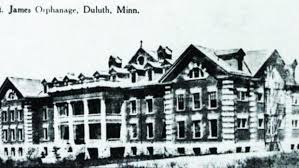
To get to the drugstore, we had to pass by the St. James Orphanage, which looked as formidable as it sounds. I was terrified of that building and the luckless children who lived there. It was as frightening as if it were the St. James Home for Retired Ogres. Up till then, I had thought that orphans were fairy tale creatures, like elves and witches; the idea of losing not one but both parents was scary enough to send me running to the bathroom to pee the second we got to the drug store.
The St. James Orphanage may have inspired my conviction, every time my parents went out at night, that something dreadful would happen and I would never see them again. Or it may have been that I was a morbidly sensitive child. I had a book of Hans Christian Andersen’s fairy tales that was missing both “The Little Match Girl” and “The Little Mermaid.” The orphaned, window-peeking Match Girl watches a happy family gathered round their Christmas tree, uses her last match to try to keep warm, and then freezes to death on the street. The Little Mermaid, after months of feeling as if she were walking on knives on her new feet, bestowed by the sea witch in exchanged for her voice, sees her beloved Prince marry somebody else, dies, and is turned into a bit of foam because she doesn’t have a human soul and so cannot go to heaven. I couldn’t read either story without bursting into inconsolable sobs so my mother’s expedient solution was to tear the gloomy pages out of the book.
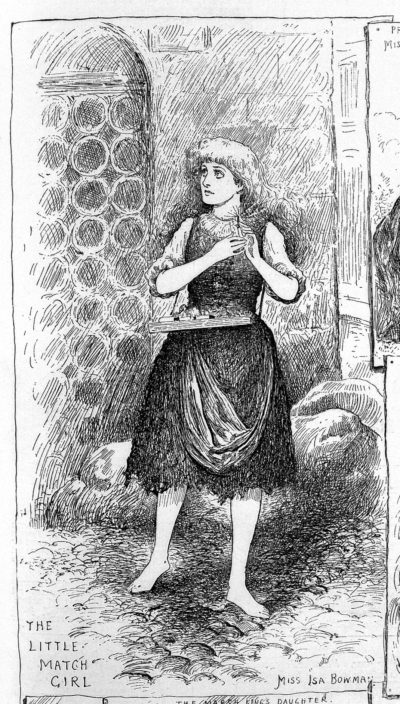
My sister, the feral child Lani, did not move into the Woodland house at the same time as the rest of us. She had been dispatched months before to our maternal grandparents in Aberdeen, South Dakota, while my parents looked for a place to live. Lani had been born in Hawaii, where my dad had spent two years in the army, pulling teeth out of soldiers on Schofield Barracks in Honolulu. Now we were all back in Minnesota (except for the exiled child), and he was ready to start his adult civilian life, in his own practice, and needed to find a home for his cute blonde wife and daughters.
My dad, mom, and I were camped at the other grandparents in Carlton, a town of 400 people half an hour outside of Duluth. My South Dakota grandmother, Nana, loved children, the younger the better, and had unending patience and tolerance for noise and mess. Grandma Marie, my dad’s mother, was only interested in clothes, her golf game, bridge, and daily Mass. While my dad was at work, and my mother stuck driving around with real estate agents looking at houses, I could be safely parked on the sofa with a book, or let out to explore the acres of woodland and plum orchard that surrounded my grandparents’ house. The lovely orchard would later be sacrificed by my grandfather to build a bomb shelter big enough for the entire town of Carlton to wait out a nuclear attack.
My frantic, difficult one-year-old sister was another story. An early and avid walker, she was Houdini-like in her ability to escape adult custody, and would have raced across the wide front lawn in seconds to get to the busy two-lane county road, a road that claimed a dog a year from my grandparents. Lani also cried non-stop and was an even pickier eater than I was. My grandma Marie was not about to give up mass, golf, or bridge to babysit such a creature. Lani was sent off to join the gaggle of grandchildren in Aberdeen, retrieved several months after we had moved into the Woodland house.
